podcast
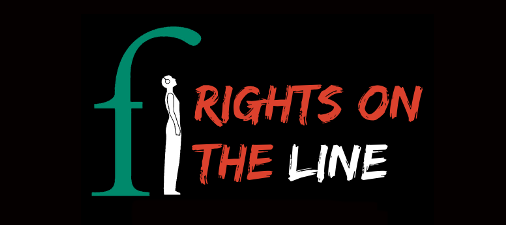
Rights on the Line is produced by Front Line Defenders, and presents the voices, perspectives and experiences of human rights defenders (HRDs) at risk and focusing on human rights issues across the globe.
For more information, contact: ahamdulay@frontlinedefenders.org
Listen to Rights on the Line episodes any of these channels:
Episodes
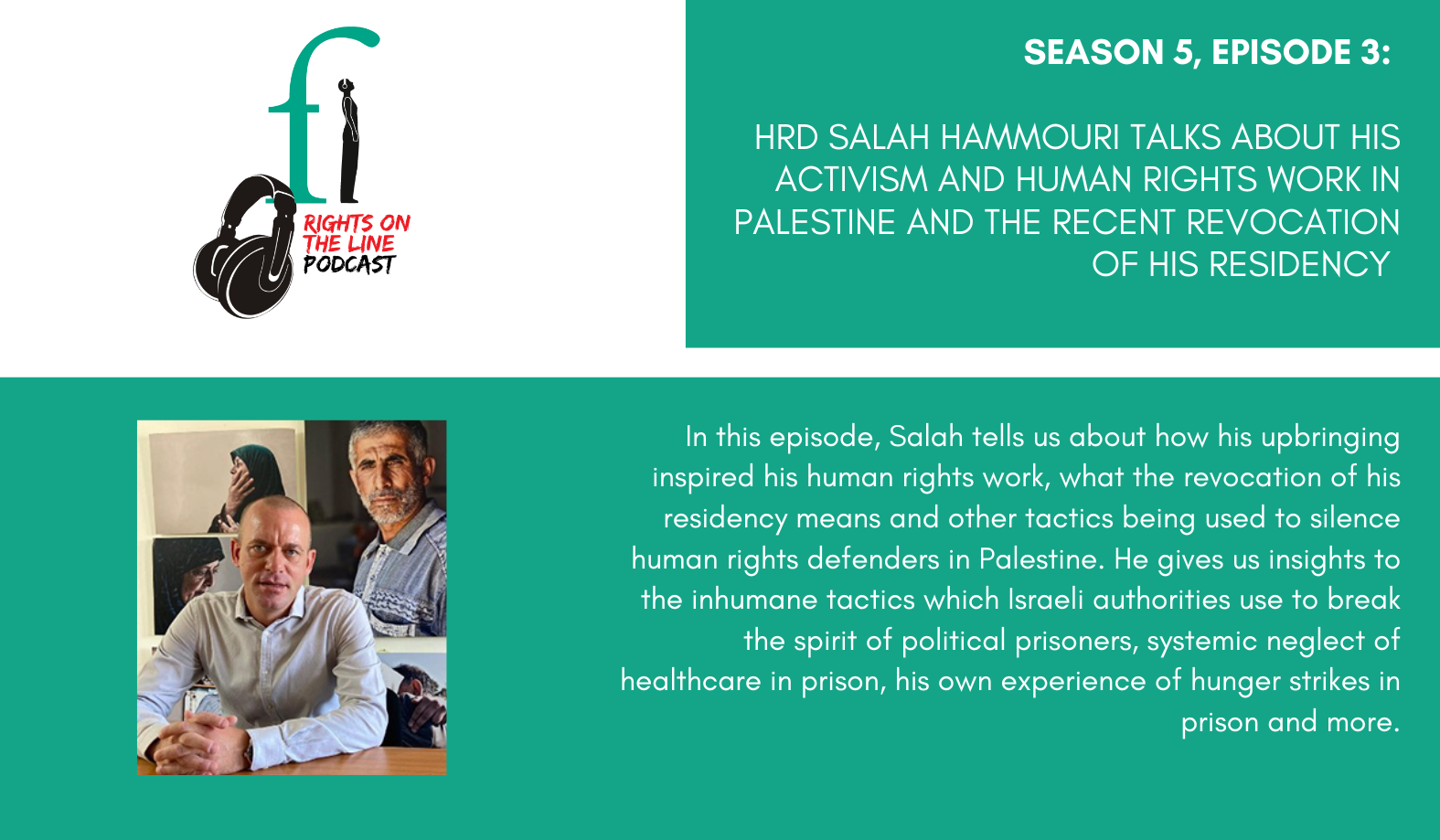
Season 5, Episode 3: Salah Hammouri: the cost of activism in Palestine and the revocation of his residency
In this episode, Salah tells us about how his upbringing inspired his human rights work, what the revocation of his residency means and other tactics being used to silence human rights defenders in Palestine. He gives us insights to the inhumane tactics which Israeli authorities use to break the spirit of political prisoners, systemic neglect of healthcare in prison, his own experience of hunger strikes in prison and more.
Listen to this episode on:
Google Podcasts Apple Podcasts Sound Cloud
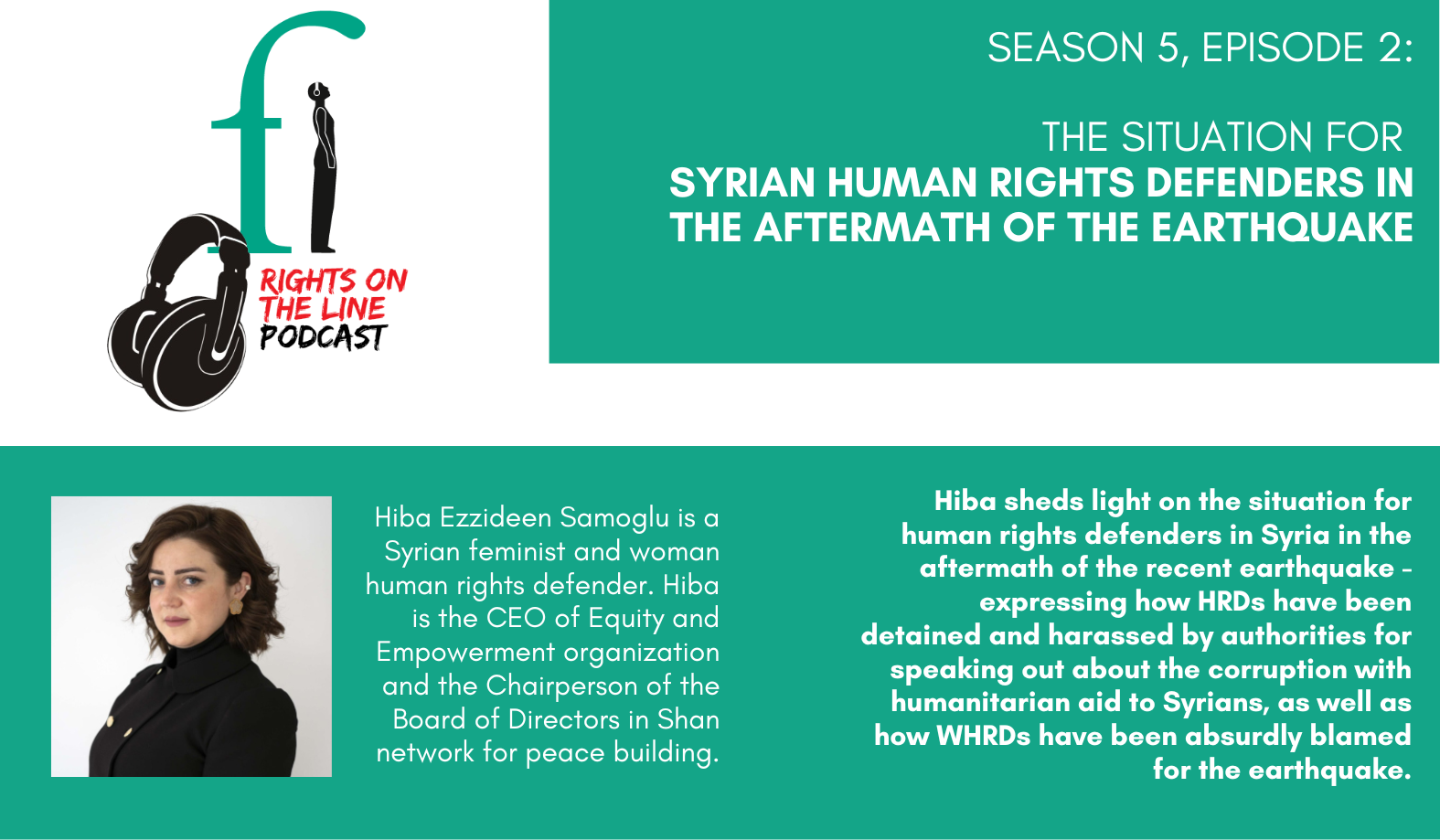
Season 5, Episode 2: Situation for Syrian Human Rights Defenders in the Aftermath of the Earthquake
Hiba sheds light on the situation for human rights defenders in Syria in the aftermath of the recent earthquake - expressing how HRDs have been detained and harassed by authorities for speaking out about the corruption with humanitarian aid to Syrians, as well as how WHRDs have been absurdly blamed for the earthquake.
Listen to this episode on:
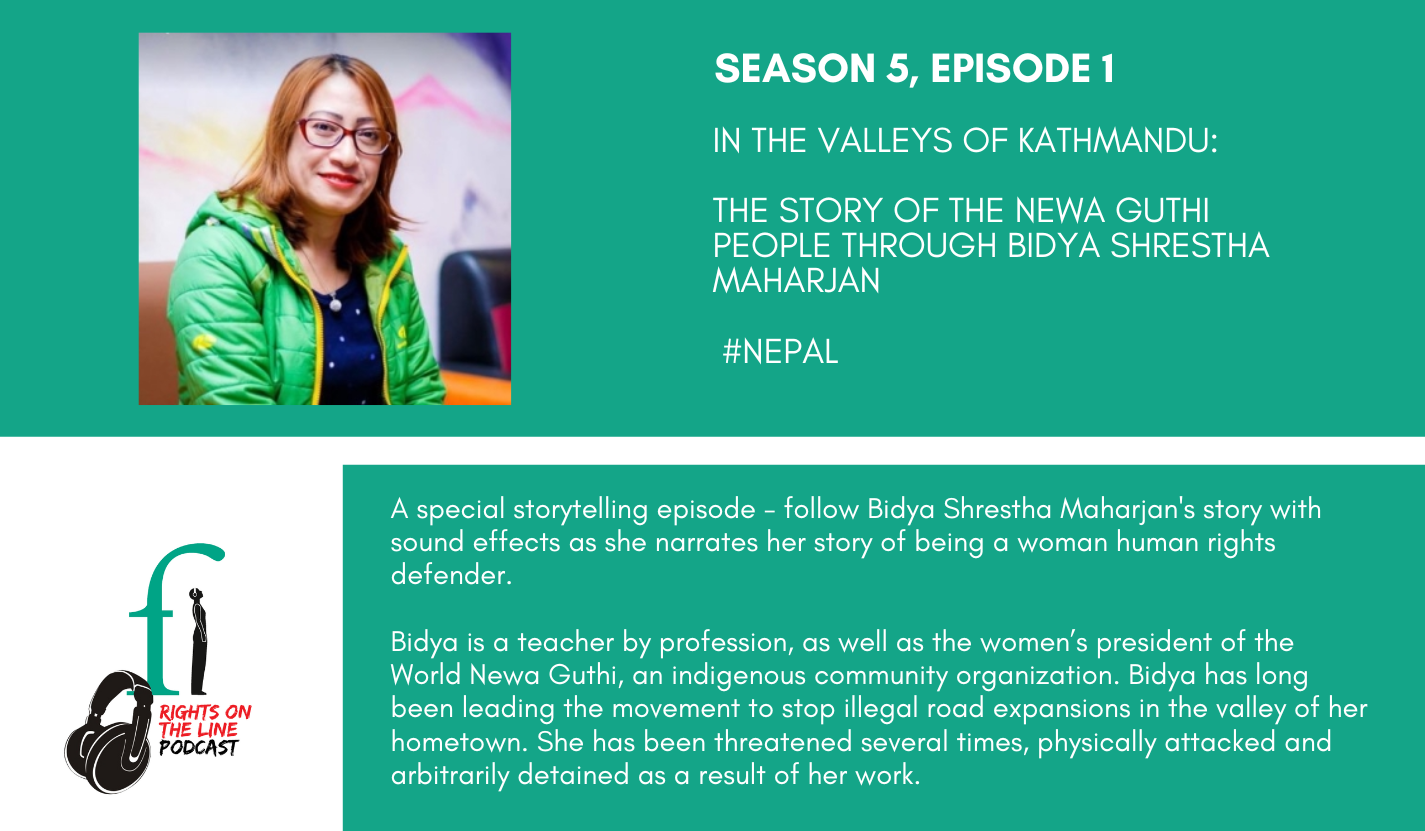
Season 5, Episode 1: In the valleys of Kathmandu: the story of the Newa Guthi people through Bidya Shrestha Maharjan
A special storytelling episode - follow Bidya Shrestha Maharjan's story with sound effects as she narrates her story of being a woman human rights defender and defending the rights of the Newa Guthi indigenous people.
Bidya is a teacher by profession, as well as the women’s president of the World Newa Guthi, an indigenous community organization. Bidya has long been leading the movement to stop illegal road expansions in the valley of her hometown. She has been threatened several times, physically attacked and arbitrarily detained as a result of her work.
Listen to this episode on:
Google Podcasts Apple Podcasts Sound Cloud
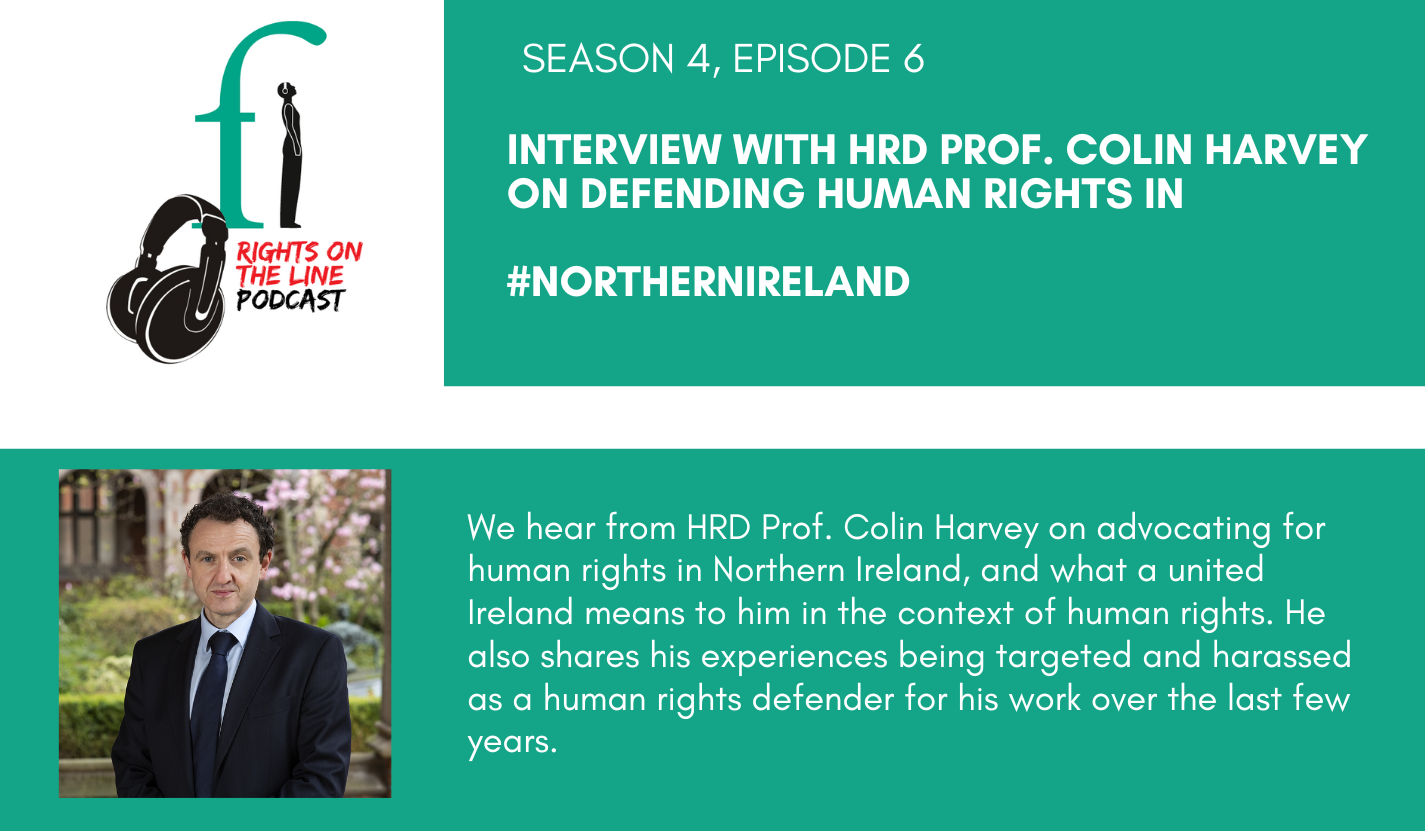
Season 4, Episode 6: Interview with HRD Prof. Colin Harvey on defending human rights in Northern Ireland
We hear from HRD Prof. Colin Harvey on advocating for human rights in Northern Ireland, and what a united Ireland means to him in the context of human rights. He also shares his experiences being targeted and harassed as a human rights defender for his work over the last few years.
Listen to this episode on:
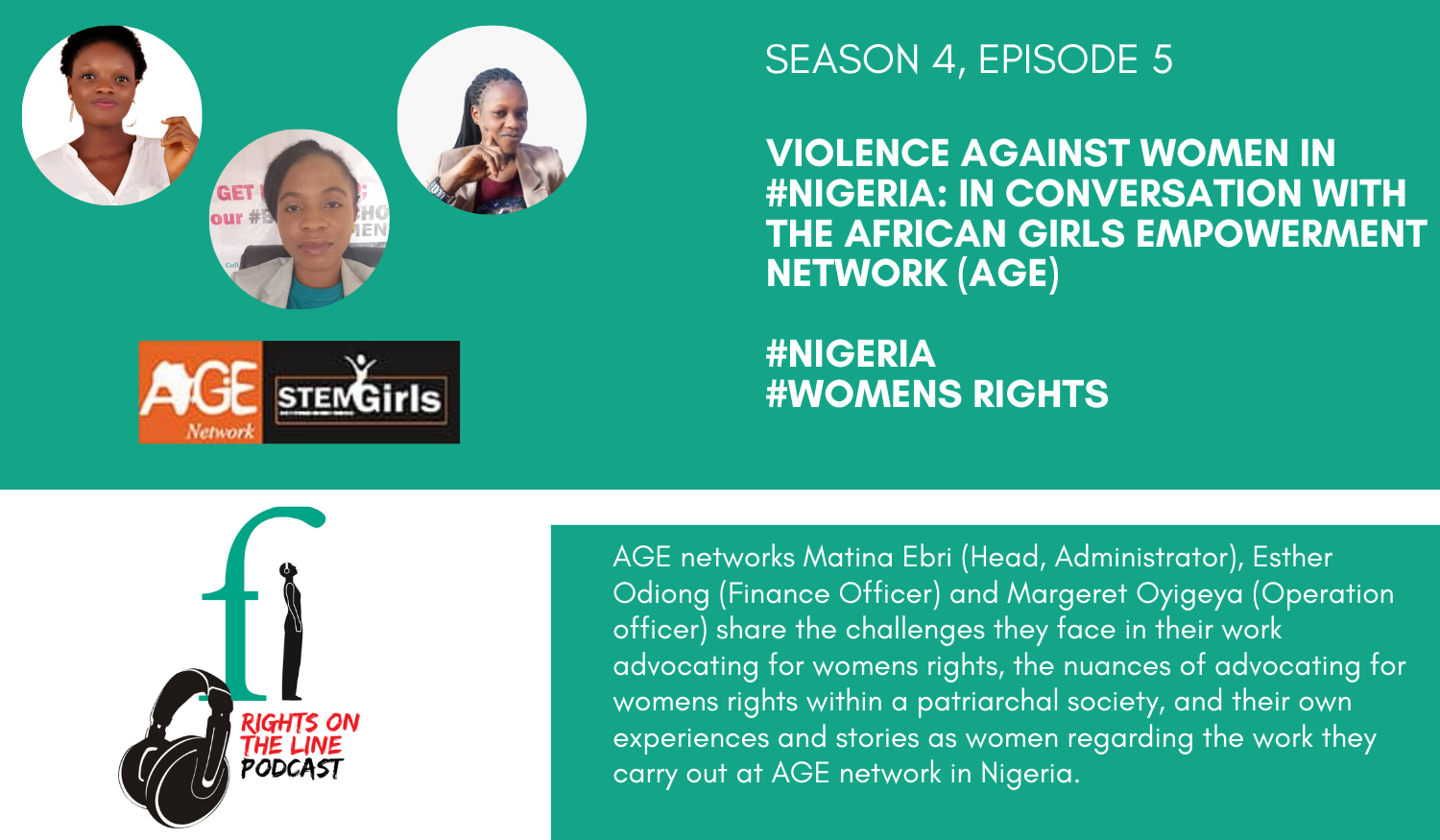
Season 4, Episode 5: Violence against women in #Nigeria: in conversation with the African Girls Empowerment Network (AGE)
AGE networks Matina Ebri (Head, Administrator), Esther Odiong (Finance Officer) and Margeret Oyigeya (Operation officer) share the challenges they face in their work advocating for womens rights, the nuances of advocating for womens rights within a patriarchal society, and their own experiences and stories as women regarding the work they carry out at AGE network in Nigeria.
Listen to this episode on:
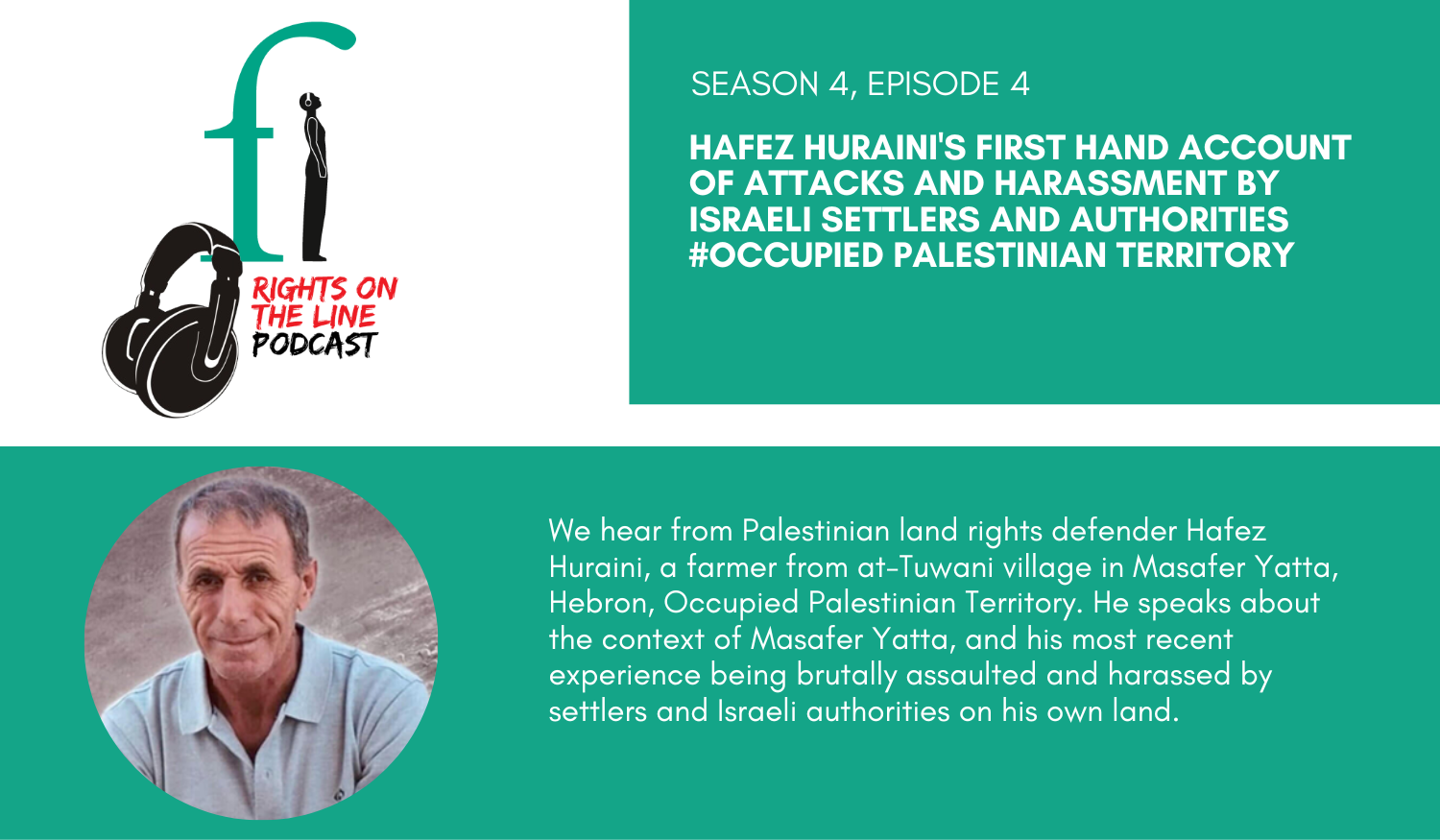
Season 4, Episode 4: First hand account: HRD Hafez Huraini attacked and harassed by Israeli settlers and authorities.
We hear from Palestinian land rights defender Hafez Huraini, a farmer from at-Tuwani village in Masafer Yatta, Hebron, Occupied Palestinian Territory. He speaks about the context of Masafer Yatta, and his most recent experience being brutally assaulted and harassed by settlers and Israeli authorities on his own land.
Listen to this episode on:
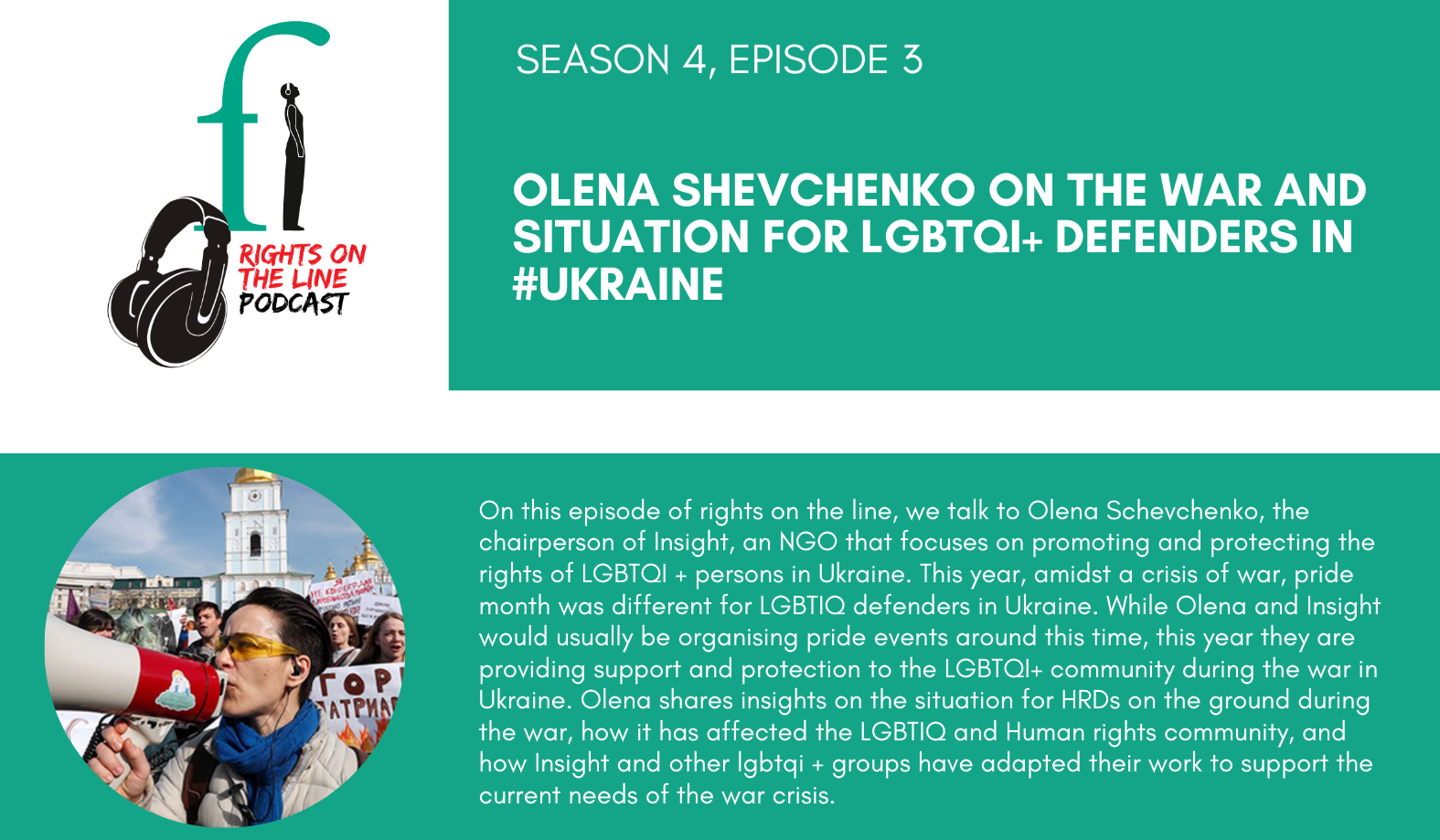
Season 4, Episode 3: Olena Shevchenko on the war and situation for lgbtqi+ defenders in #Ukraine
On this episode of Rights on the Line, we talk to Olena Shevchenko, the chairperson of Insight, an NGO that focuses on promoting and protecting the rights of LGBTQI + persons in Ukraine. This year, amidst a crisis of war, pride month was different for LGBTIQ defenders in Ukraine. While Olena and Insight would usually be organising pride events around this time, this year they are providing support and protection to the LGBTQI+ community during the war in Ukraine. Olena shares insights on the situation for HRDs on the ground during the war, how it has affected the LGBTIQ and Human rights community, and how Insight and other lgbtqi + groups have adapted their work to support the current needs of the war crisis.
Listen to this episode on:
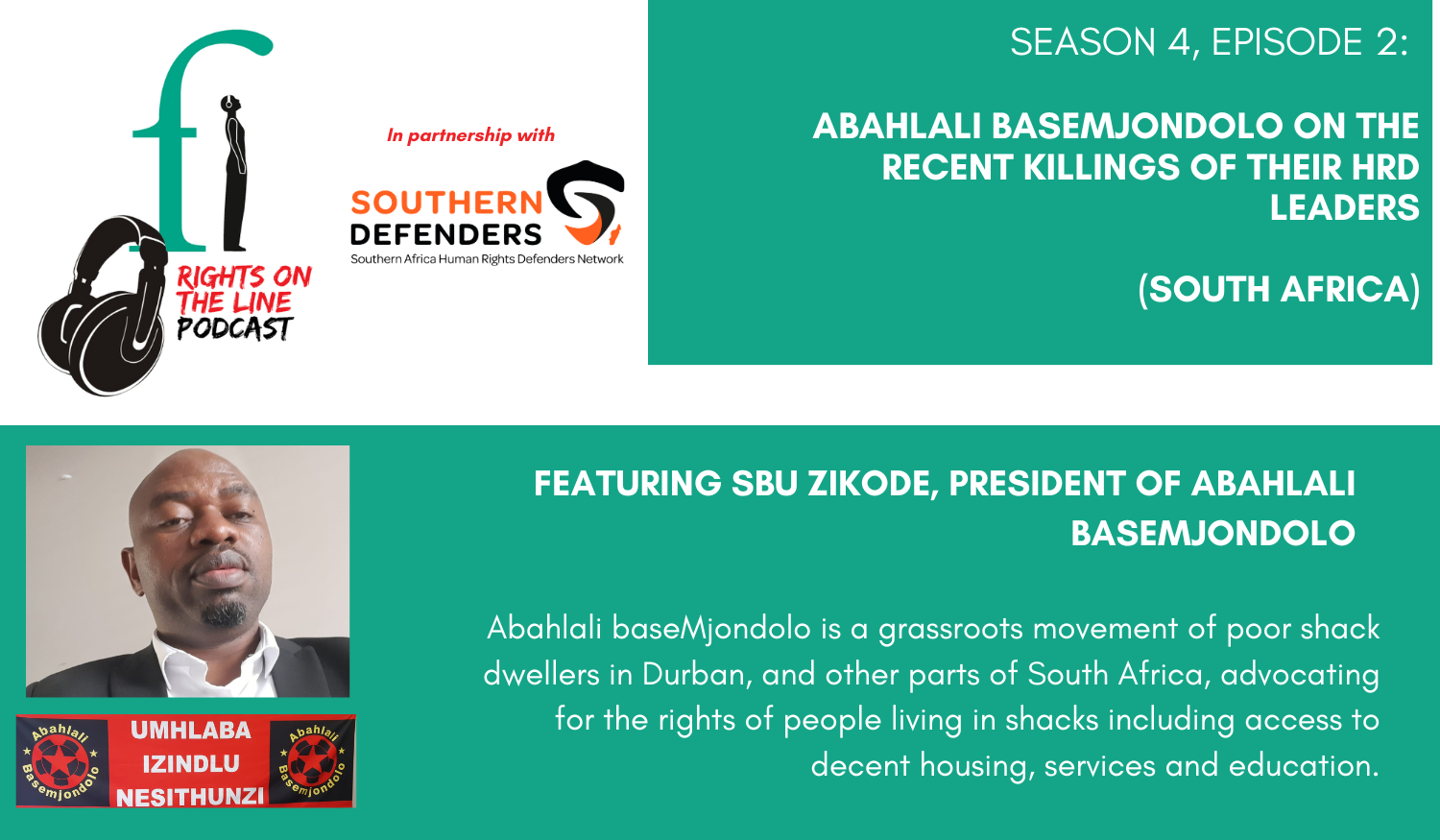
Season 4, Episode 2: Abahlali baseMjondolo on the recent killings of their HRD leaders
Abahlali baseMjondolo is a grassroots movement of poor shack dwellers in Durban and other parts of South Africa, advocating for the rights of people living in shacks, including access to decent housing, services and education. Since their inception, leaders of the fast growing movement – with a member base of up to 100,000 – have been targeted and sadly, killed.
In the last two weeks, two leaders were again murdered, bringing the number of HRDs killed in the movement to over 20. 30-year old activist Ayanda Ngila was gunned down while tending to a communal garden in Cato Crest. He was a branch chairperson at the time of his murder. Shortly after, Bongumusa Ayanda Manqele was killed in eNkanini informal settlement during a raid by a large police contingent. We chat to one of Abahlali’s prominent leaders, Sbu Zikode, to hear more about the situation and how ABM has been targeted for their human rights work.
Listen to this episode on:
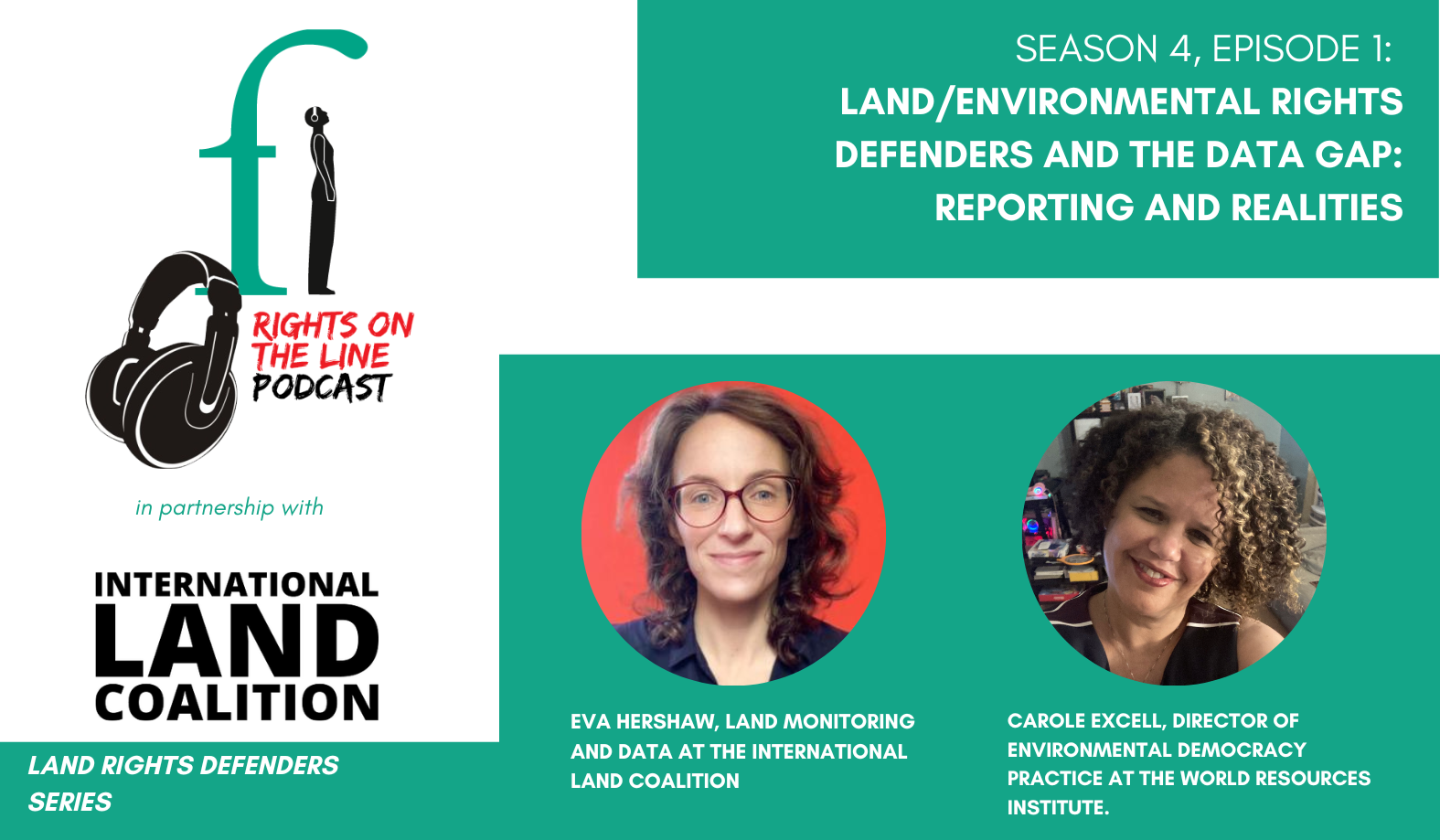
Season 4, Episode 1: Land/environmental rights defenders and the data gap: reporting and realities
Gaps in state-reported data on land and environmental rights defenders negatively and severely impacts the ability to monitor and mitigate situations where human rights defenders are at risk.
In 2020, Front Line Defenders reported that 331 human rights defenders were killed, 69% being land and environmental rights defenders. But, Official data on killings remain limited, while there is even less data on physical and other types of lethal attacks on defenders.
In this episode, we talk about the gap in data in terms of land rights defenders, touching on the crucial gap report and the data working group. We chat to Carole Excell, Director of Environmental Democracy Practice at the World Resources Institute, and Eva Hershaw, who works on land and monitoring data at the international land coalition.
Listen to this episode on:
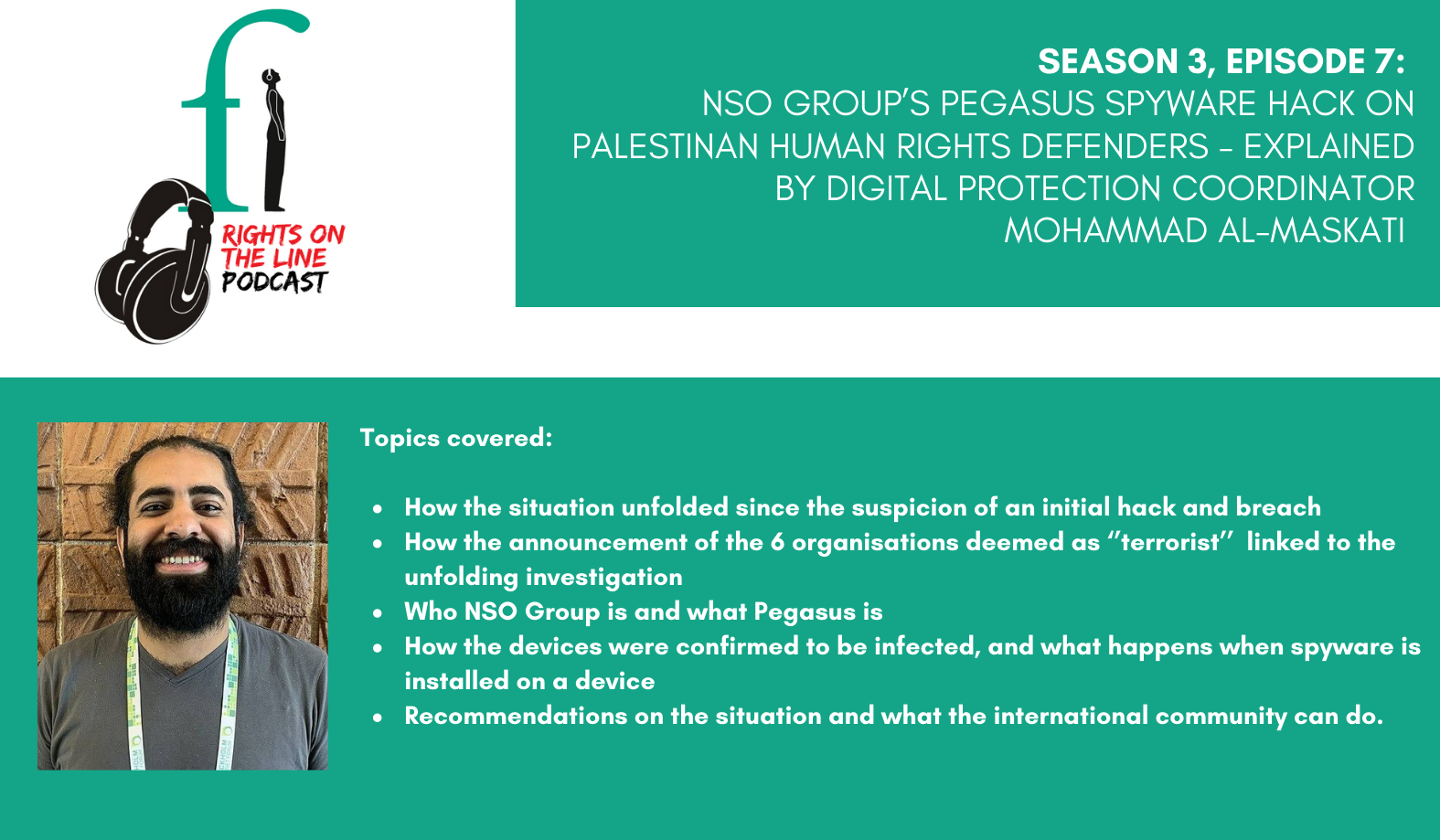
Season 3, Episode 7: NSO Group’s Pegasus Spyware hack on Palestinan HRDs - explained by DPC Mohammad Al-Maskati:
Topics covered:
- How the situation unfolded since the suspicion of an initial hack and breach
- How the announcement of the 6 organisations deemed as‘’terrorist’’ linked to the unfolding investigation
- Who NSO Group is and what Pegasus is
- How the devices were confirmed to be infected, and what happens when spyware is installed on a device
- Recommendations on the situation and what the international community can do.
Listen to this episode on:
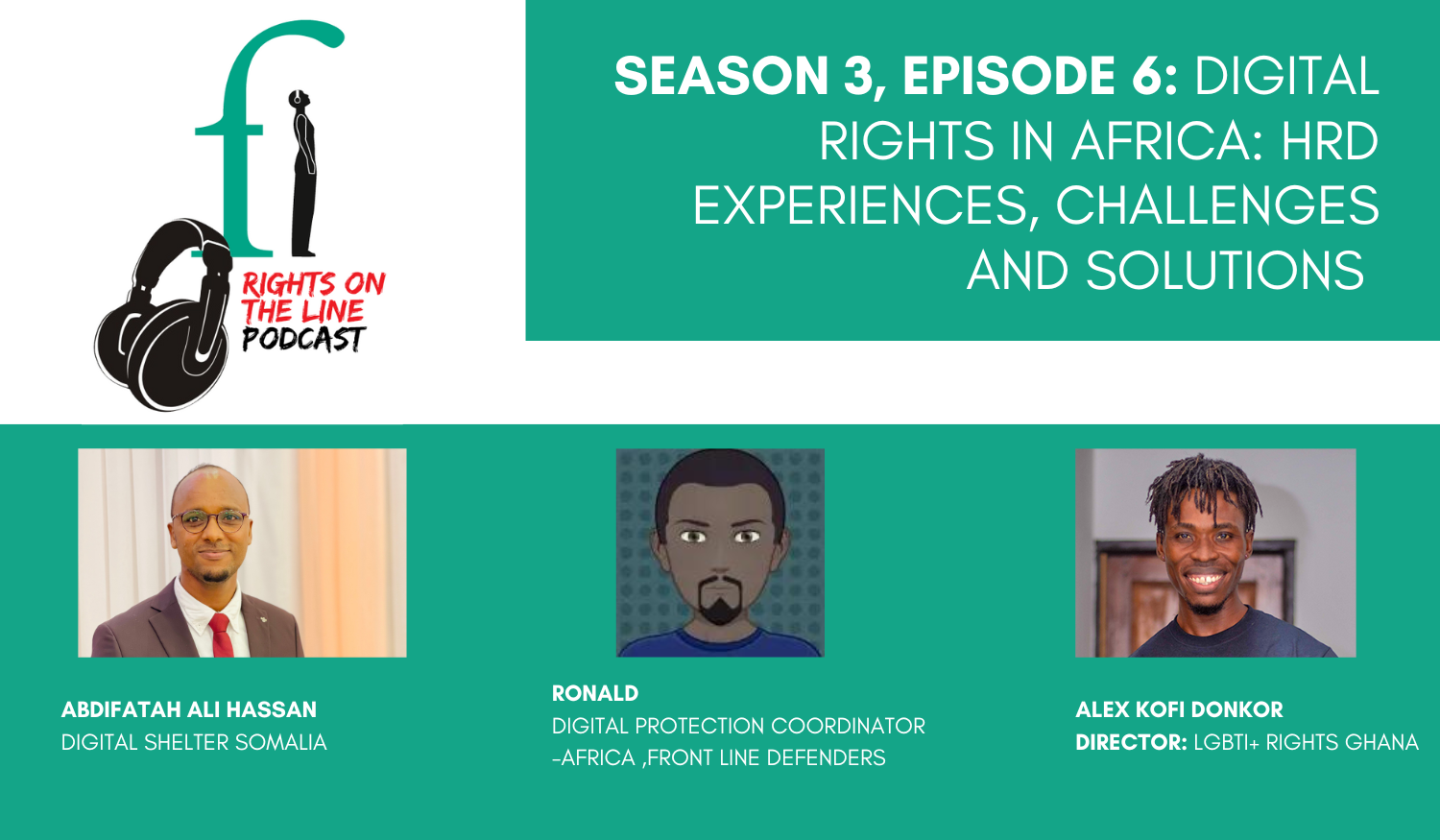
Season 3, Episode 6: Digital Rights in Africa: HRD experiences, challenges and solutions
In this episode, we talk about human rights defenders in Africa experiencing challenges in the digital space, on social media platforms and more.
Ronald shares his insights as the Digital Protection Coordinator for the Africa region at Front Line Defenders, as well as very NB tips on how HRDs can protect themselves in the Digital space.
Abdifatah, and HRD from Digital Shelter in Somalia, talks about a recently released report by Digital Shelter on how HRDs in Somalia and Africa are targeted digitally, as well as how it might be remedied.
Alex talks about how LGBTI+ Rights Ghana was challenged when their social media accounts were shut down without warning in relation to their work, and how they went about dealing with that.
Listen to this episode on:
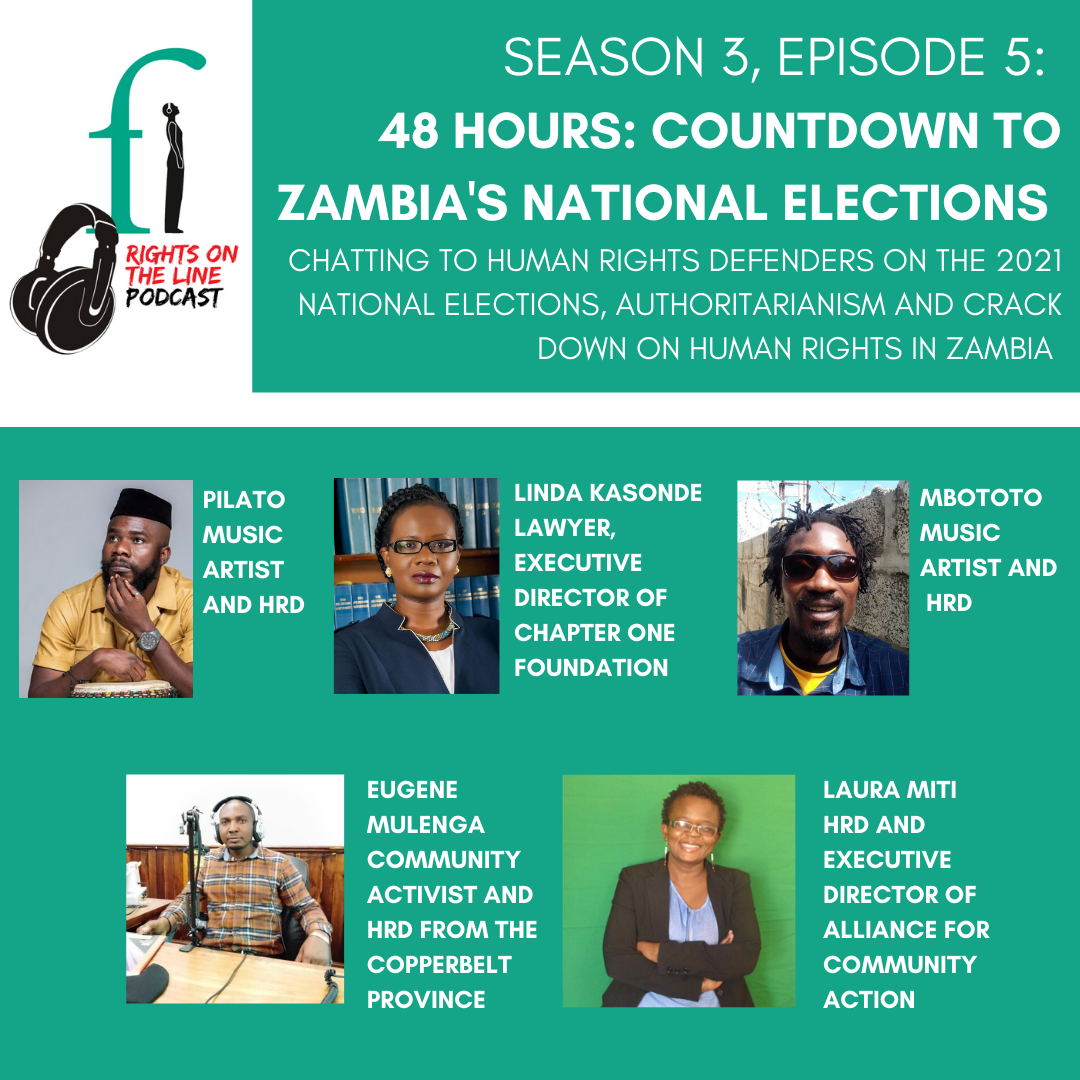
Season 3, Episode 5: 48 Hours: Countdown to Zambia's national elections
Zambias national elections will be held on the 12th of August 2021. This comes against a dangerous background of the country veering towards dangerous authoritarianism. Human rights defenders (HRDs) in Zambia face arrests, violent threats, intimidation tactics, surveillance, and smear campaigns as the government persecutes civil society and challenges the legitimacy of HRDs who speak out against the crack down on freedom of speech, freedom of assembly, freedom of association, and other core civil and political rights. HRDs worry that elections will not be free and fair, and that the state of authoritarianism will only worsen.
Listen to our guests share different insights:
MUSIC: TATWASHUPA BY HRD ARTIST PILATO
Linda Kasonde: 01m54s
Pilato: 15m04s
Laura Miti: 32m04s
Euegene Mulenga: 44m34s
Mbototo: 01h03m04s
Listen to this episode on:
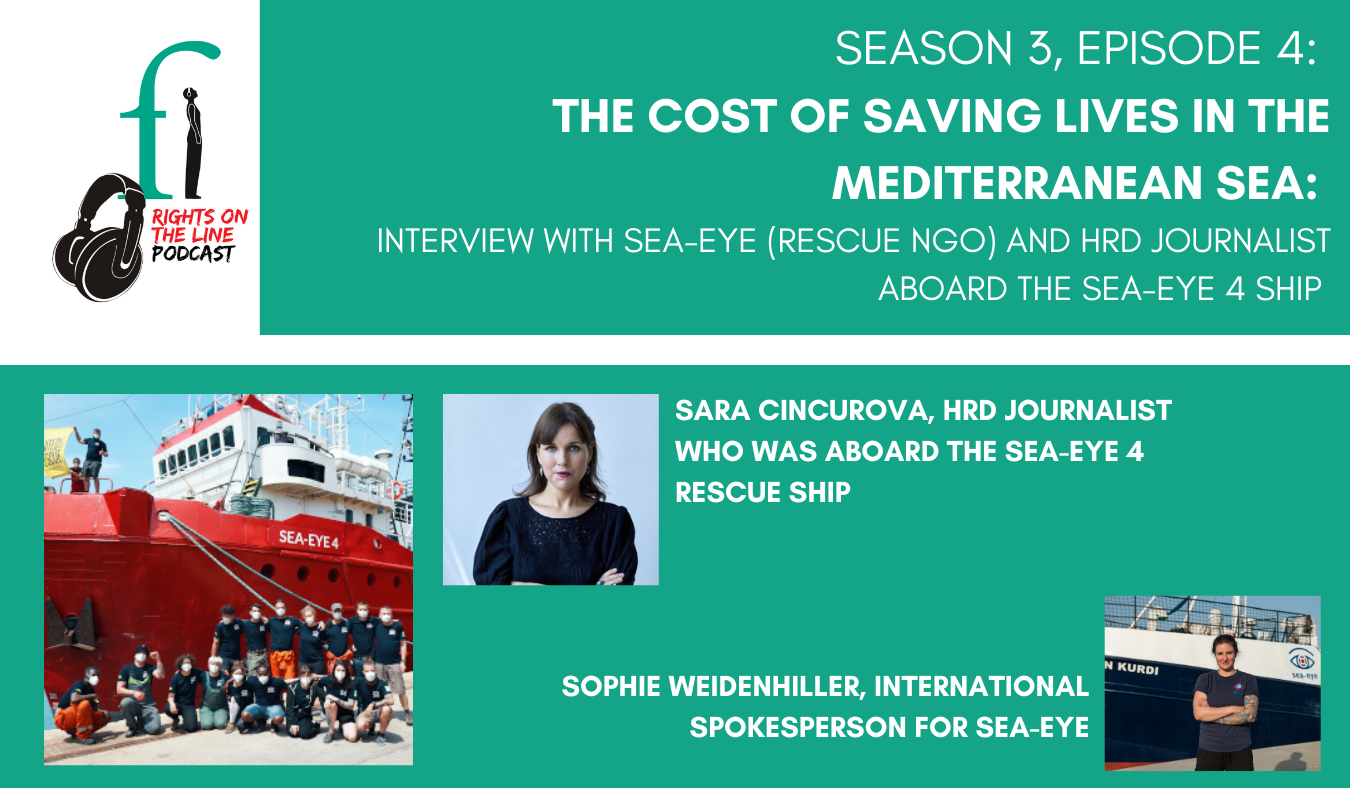
Season 3, Episode 4: The cost of saving lives in the Mediterranean Sea
Front Line Defenders Rights on the Line podcast, presenting the voices, perspectives and experiences of human rights and human rights defenders (HRDs) across the globe. In this episode, we chat to two HRDs who were a part of the SEA-EYE 4 ship crew, which rescued 408 people from five different refugee boats in distress in May 2021.
Sophie Weidenhiller is from the German NGO Sea-Eye, who works for the rescue of fleeing people in the central Mediterranean Sea. Sara Cincurova is a Slovakian HRD journalist who writes on issues ranging from migration, to human rights, humanitarian issues, and women's rights. She has reported from about fifteen different countries, and has been published by BBC and The Guardian, among others.
Sara and Sophie will speak on Sea-Eyes most recent heart-wrenching humanitarian mission aboard the Sea Eye 4 ship, as well as their experiences being targeted as human rights defenders for the their sea-rescue efforts and work.
Music: Soft Instrumental Hip-hop by jorikbasov
Listen to this episode on:
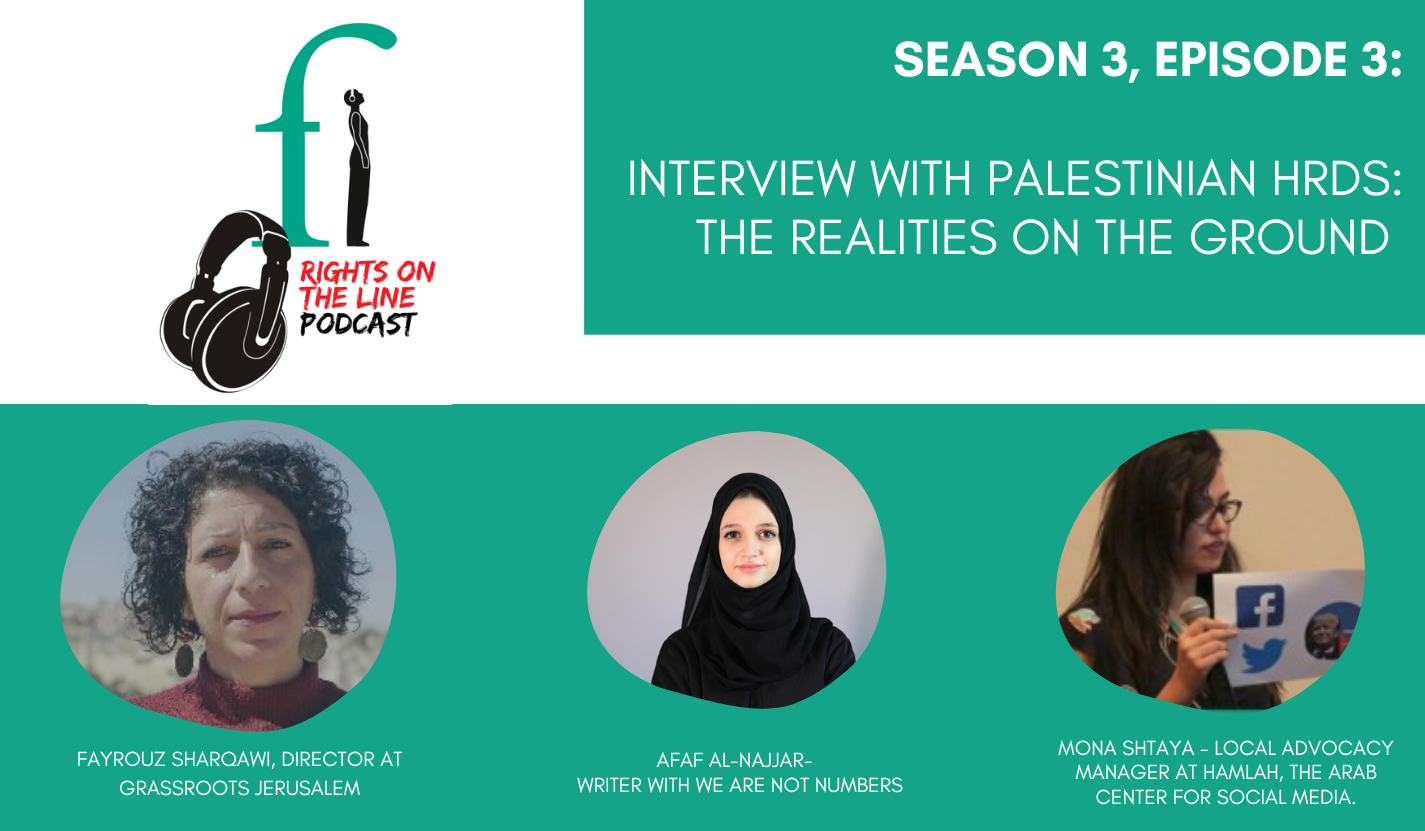
Season 3 Episode 3: Interview with Palestinian HRDs: The realities on the ground
In the last two weeks, unwarranted violence against Palestinians by Israeli authorities has increased. Palestinians on the ground have resisted, and in turn, Israeli forces have since used repeated excessive force on Palestinians. As Airstrikes continue, Israel is cracking down on media with strong censorship of Palestinian content, and the recent targeted bombing of Al-Jazeera and Associated Press building. Israel is using its connections and influence with social media companies to censor content and expression online. Today we speak to 3 Palestinians to shed light on the situation on the ground, what Palestinians need to support their struggle, and what the reality of the struggle is for palestinians.
Our guests today include Fayrouz Sharqawi, the director at Grassroots Jerusalem, a platform for Palestinian and international activists and organizations in Jerusalem. Afaf Al-Najjar is in Khan Younis in Gaza, and is a writer with We Are Not Numbers. Lastly, Mona Shtaya is a Communicator, campaigner, Digital/ Human Rights defender and Local Advocacy Manager at Hamlah, the Arab center for social media.
Listen to this episode on:
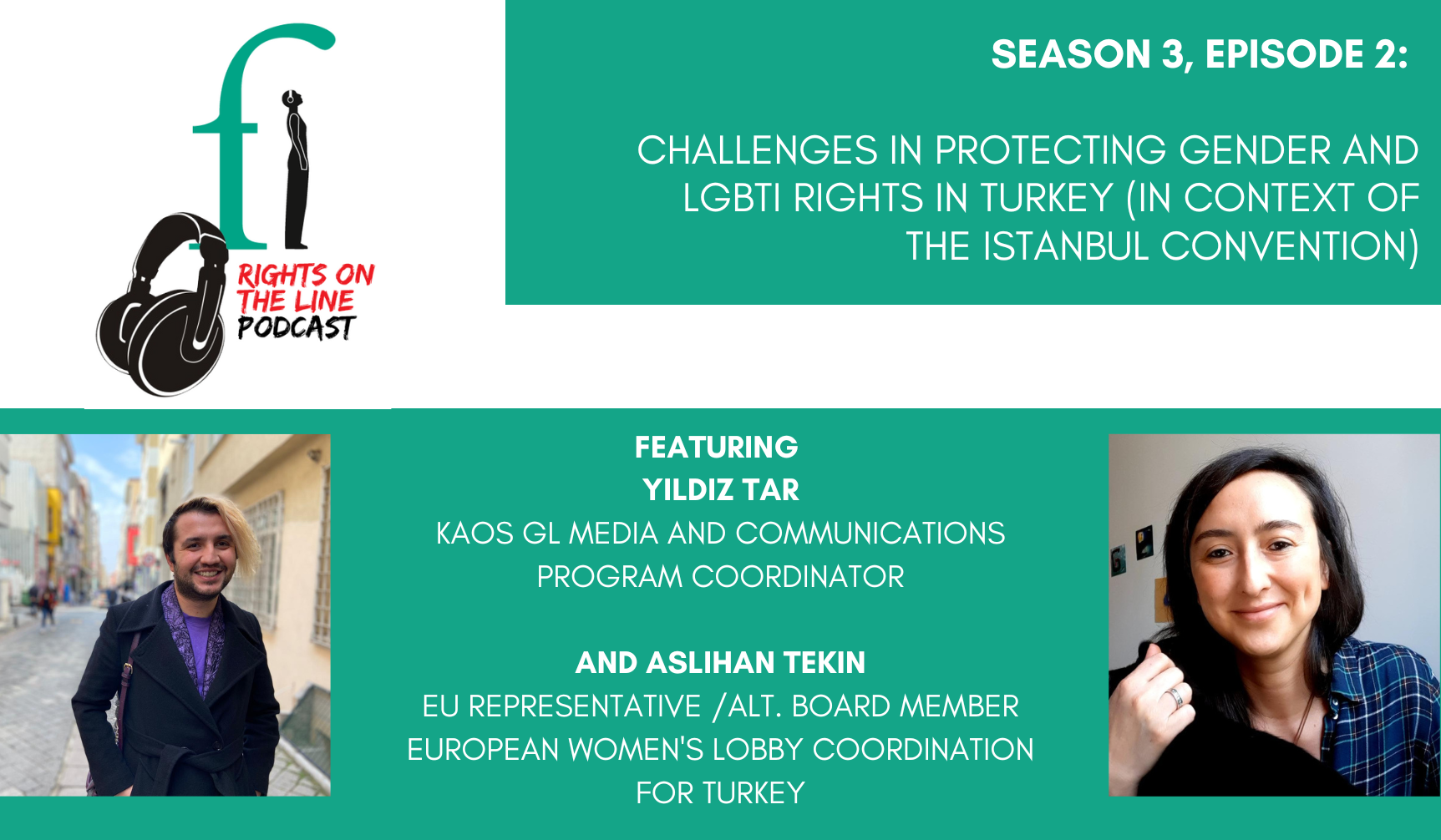
Season 3, Episode 2: Challenges in protecting gender and LGBTI rights in Turkey (in context of the Istanbul Convention)
We discuss the challenges faced by human rights defenders working on gender and LGBTI issues, in light of the recent withdrawal of Turkey from the Istanbul Convention. We chat to Aslıhan Tekin, the EU Representative / Alternate Board Member of the European Women's Lobby Coordination for Turkey, as well as Yildiz Tar, Media and Communications Program Coordinator at Kaos GL, an organisation which aims to advance the rights of the LGBTIQ community in Turkey. Our guests will shed light on the pushback against gender issues in Turkey, and how the withdrawal from the Istanbul Convention impacts women, and women human rights defenders, and LGBTI rights defenders and the LGBTI community.
Listen to this episode on:
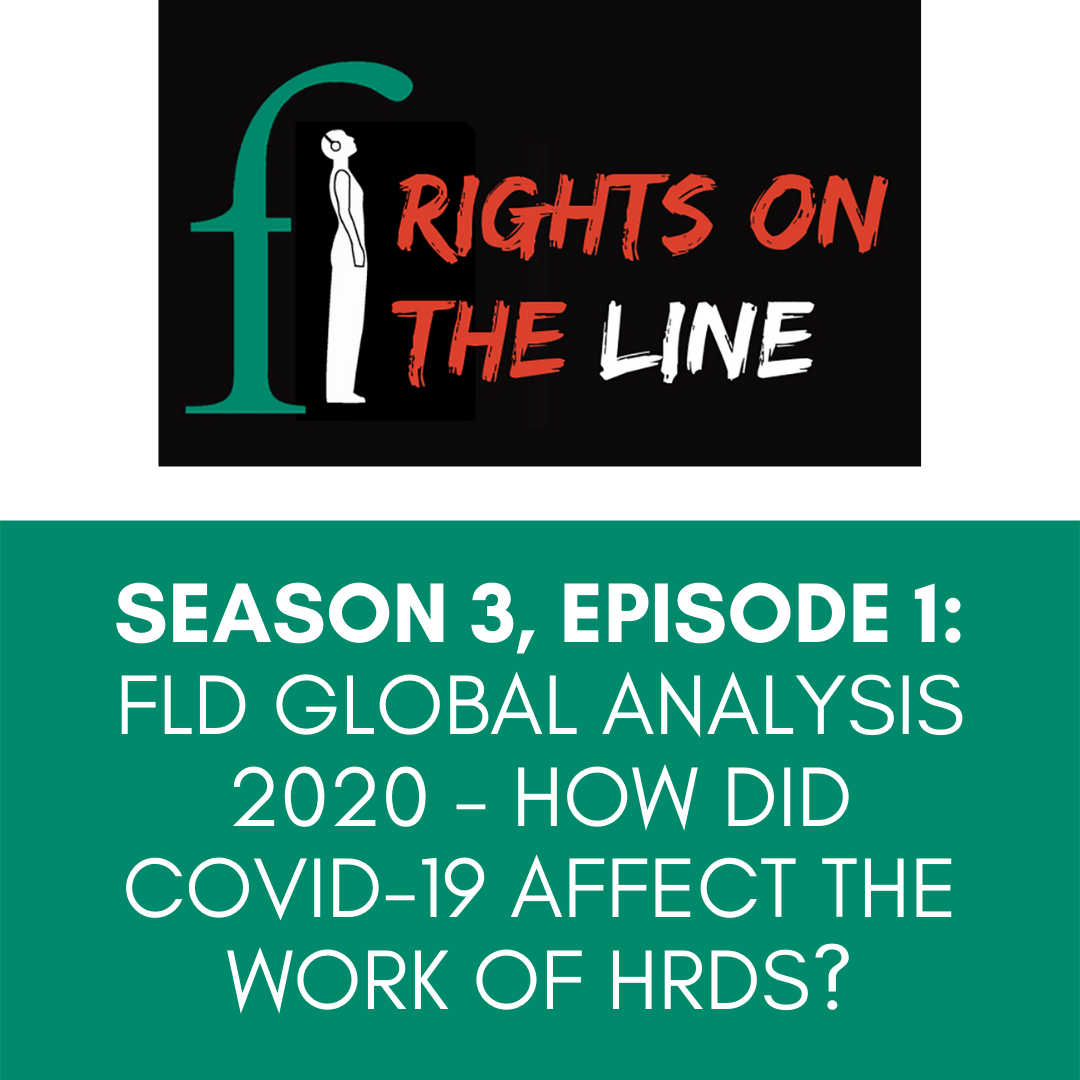
Season 3, Episode One: FLD Global Analysis 2020 - How did Covid-19 affect the work of HRDs?
In this episode, we discuss the findings of the Front Line Defenders Global Analysis report 2020, focusing on the impact of Covid-19 on the work of human rights defenders, especially in terms of digital security and lockdown regulations. Guests include: Ed O' Donovan, Head of Protection at Front Line Defenders; a HRD from Zambia, an HRD from the Colombian organisation ''Somos Defensores'' speaking on the killings in Colombia, and Bestang Sarah Dekdeken from the Philippines speaking about the impact of Covid-19 on indigenous rights defenders in the Philippines.
Listen to this episode on:
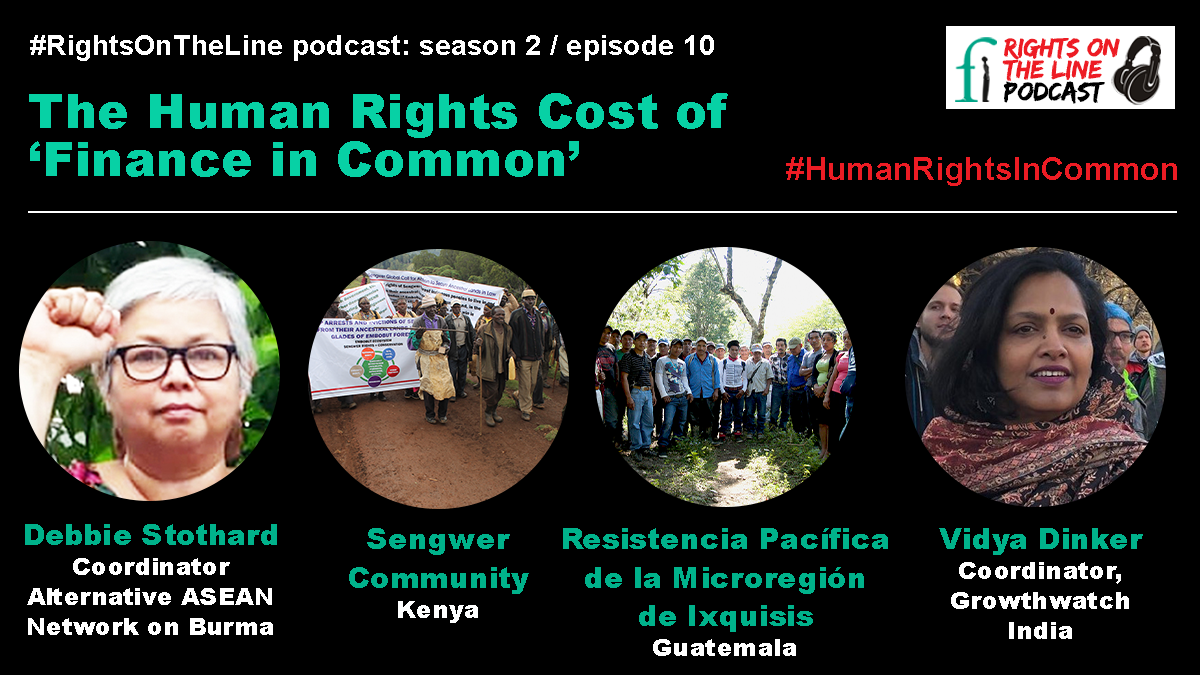
Season 2, Episode 10: The Human Rights Cost of 'Finance in Common'
This is a special episode, produced by the Coalition for Human Rights in Development. in collaboration with Front Line Defenders.
Ahead of the upcoming Finance in Common Summit in Paris, we speak with defenders in Burma (Debbie Stothard), Kenya, Guatemala and India, about the human rights impact of projects imposed in the name of development
From the 9th to the 12th of November, all public development banks in the world will be together for the first time ever. Over 450 finance institutions and heads of governments will meet to discuss their response to global challenges such as climate change and the Covid-19 pandemic.
Under the flag of "sustainable development", these banks often present themselves as the world's saviours. But their investments come at a high price. Activities they finance have been linked to thousands of human rights violations. Human rights defenders who oppose harmful projects are being accused of being “anti-development” and they are being threatened, attacked and killed. Indigenous Peoples are seeing their territories being pillaged. Rural communities are being forcibly evicted.
Yet, despite growing evidence about these abuses, human rights are not even mentioned in the Finance in Common summit agenda and are glossed over in the proposed joint declaration that all banks will sign at the end of the event. Once again, the voices of human rights defenders and local communities are being completely ignored.
Listen to this episode on:
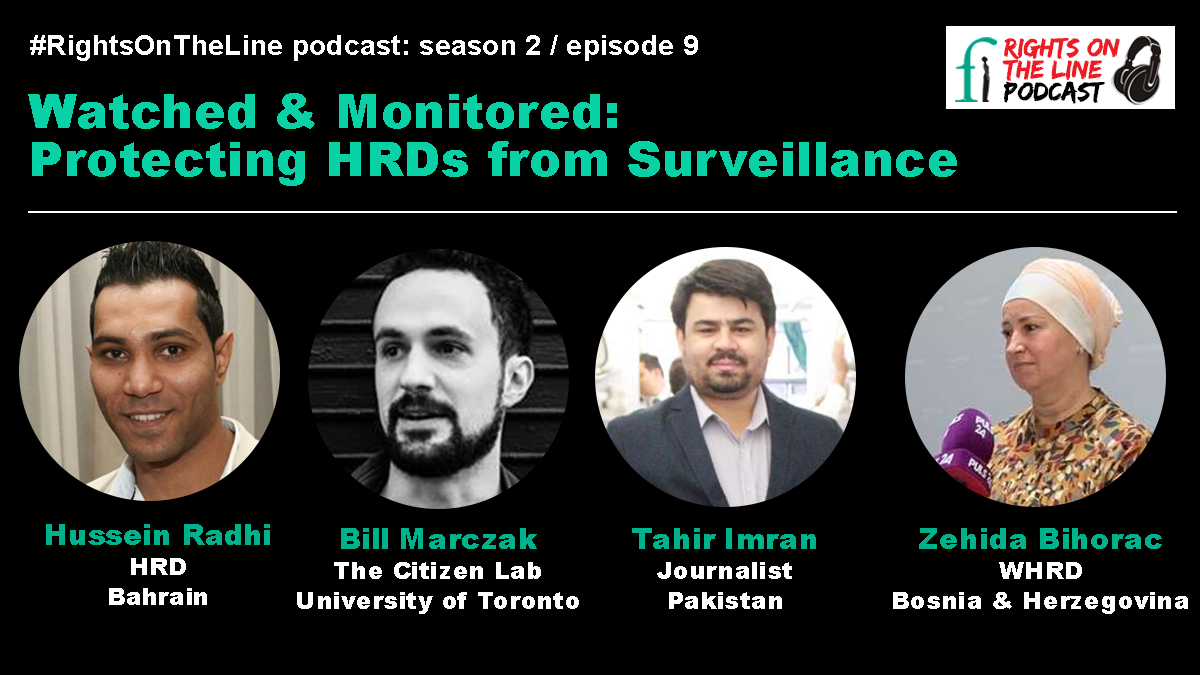
Season 2, Episode 9: Watched and Monitored: Protecting HRDs from Surveillance
- FLD Intro: 00:00 - 01:20
- Hussain Radhi, Bahrain: 01:20 - 04:38
- Bill Marczak, The Citizen Lab, Canada: 04:39 - 16:11
- Tahir Imran, Pakistan: 16:12 -30:02
- Zehida Bihorac, Bosnia & Herzegovina: 30:03 - 36:02
Over the years, surveillance techniques have become more sophisticated. Methods of spying, and the powerful authorities using these methods to monitor human rights defenders, are more and more difficult to detect as digital spyware technology advances. In this episode we speak with HRDs and digital security experts to take a closer look at some of the ways authorities are getting too close.
Often when you read reports of phone hackings and spying of human rights defenders, often the name ‘Pegasus’ appears. Pegasus is spyware developed by the Israeli cyberarms firm, NSO Group Technologies. This spyware can be installed on ios and Android phones and is capable of reading text messages, tracking calls, collecting passwords, mobile phone tracking, accessing the target device's microphone(s) and video camera(s), and gathering information from apps.
NSO Group has stated that with this spyware, they enable authorized governments to “combat terror and crime.” But despite these claims, the group does not exercise control over the use of Pegasus, which authoritarian regimes can and have used to monitor HRDs.
Listen to this episode on:
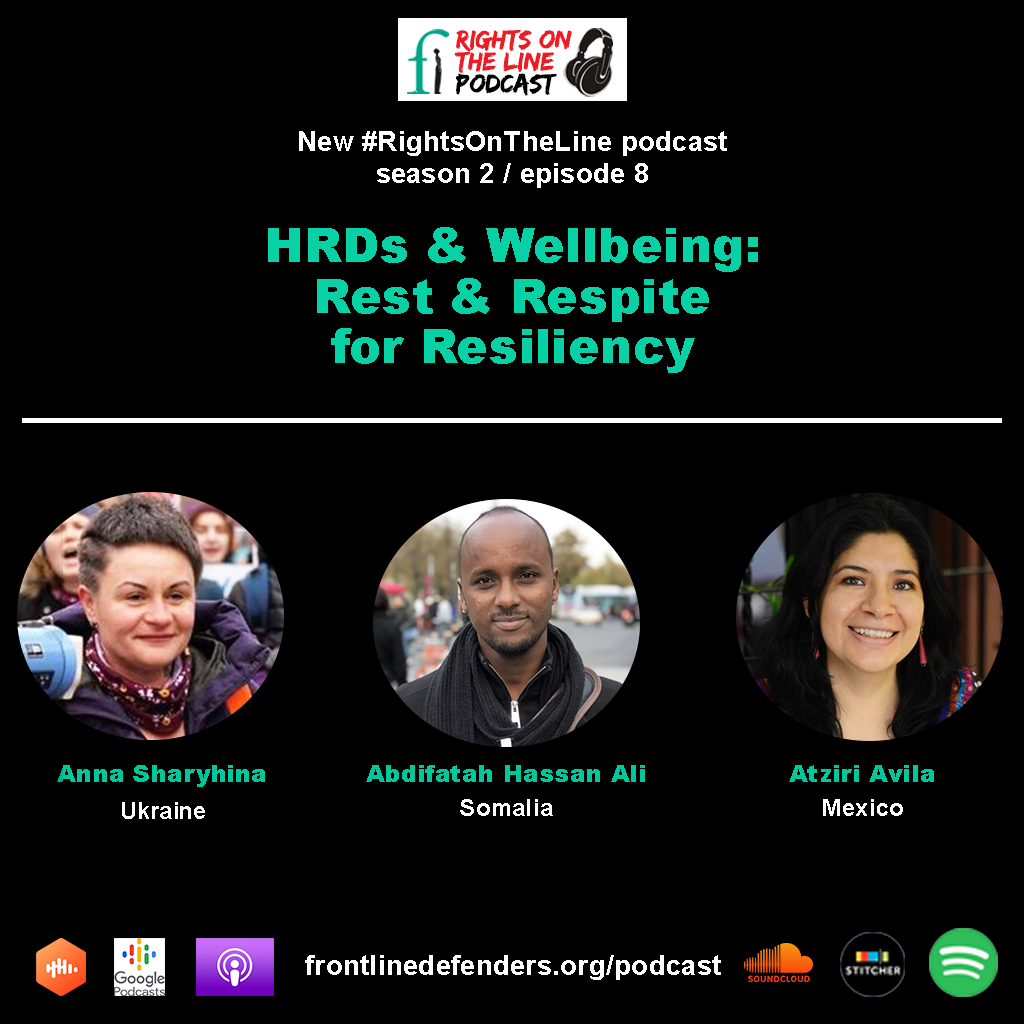
Season 2, Episode 8: HRDs & Wellbeing: Rest & Respite For Resiliency
- FLD Intro: 00:00 - 01:50
- Abdifatah Hassan Ali, Somalia: 01:50 - 13:05
- Anna Sharyhina, Ukraine: 13:05 - 18:41
- Atziri Avila, Mexico: 18:42 -24:50
With the global pandemic continuing to impose social distancing and other changes to our lives, human rights defenders are increasingly dealing with new types of stress, on top of the regular barrage of threats, harassment and smearing, among other risks and threats.
In this episode we go a bit behind the scenes with three human rights defenders to discuss how they deal with the impact of the work on their lives and wellbeing.
One of the supports that Front Line Defenders offers to HRDs for their wellbeing and stress management is the Rest & Respite Programme. The programme provides an opportunity for HRDs who are exhausted, experiencing burnout or facing temporary safety issues to take some time out from their work and the stressful environment in which they are working. Front Line Defenders has been supporting HRDs on R&R since 2005, and they can be hosted for short stays in Ireland or in another location of their choosing.
While the primary objective of the R&R is to take some time to rest, HRDs can also use the period of relocation to develop their personal skills and contacts in order to prepare for their continued activism in their home country and to manage the risks they face. Activities include language classes, security training, networking with other human rights organisations or public speaking about their work. Some defenders just want to spend some time with their families. Others use the time to focus on their health and well-being.
Human rights defenders tell us that the time and space to reflect, the opportunity to experience a new culture and the friendships they develop, give them a new perspective and renewed energy to take on the challenges of their work on their return home.
Listen to this episode on:
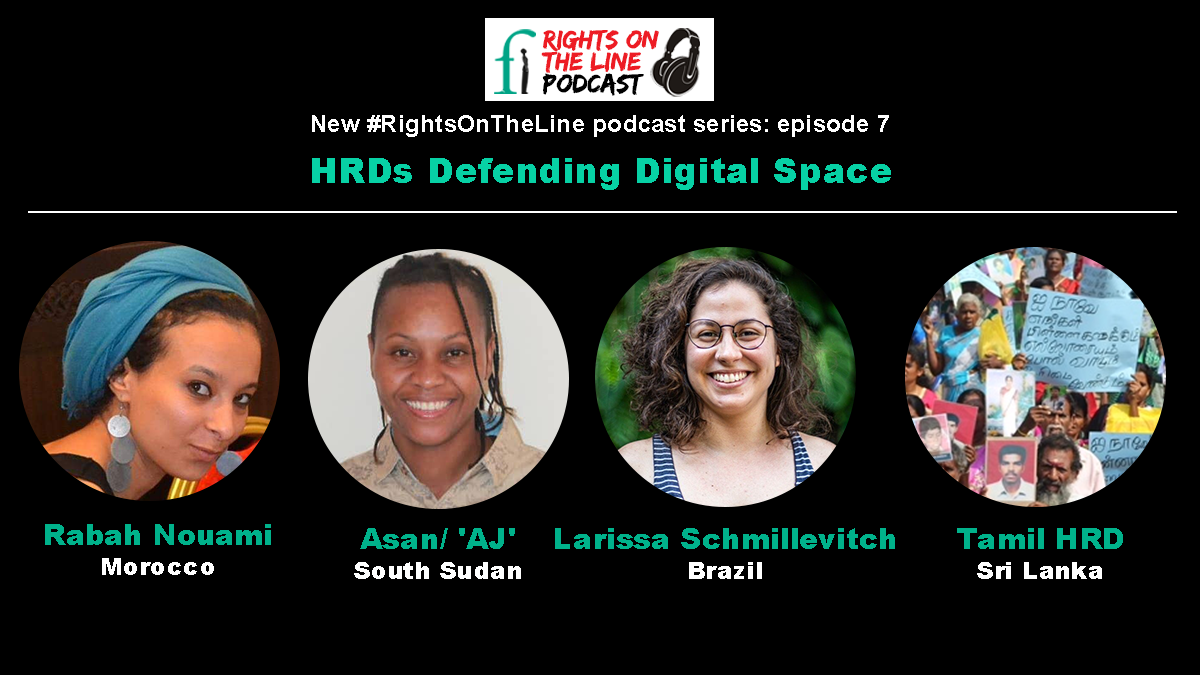
Season 2, Episode 7
HRDs Defending Digital Space
- FLD Intro: 00:00 - 01:18
- Rabah Nouami, Morocco: 01:18 - 09:42
- Larisa Schmillevitch, Brazil: 09:43 - 22:45
- Asan 'AJ', South Sudan,: 22:46 - 29:31
- HRD, Sri Lanka: 29:32 - 39:54
In this episode of the Front Line Defenders podcast Rights on the Line, we’ll hear from human rights defenders in Morocco, Sri Lanka, South Sudan, and Brazil talk about the unique online threats to their work and when the significance of digital protection can mean the difference between life and death.
Through the global pandemic, we are all making adaptations to new modes of working. Many of us are now work remotely, in different physical and emotional environments. But for those human rights defenders whose work always posed threats to their wellbeing and safety, the crisis has no doubt been abused to further repress their activities. Defending digital safety has never been more urgent.
Since the outbreak of Covid-19, governments around the world have introduced and implemented sweeping restrictions on freedom of movement and freedom of assembly. Defenders cannot access their offices to communicate with one another from safer locations. Risks to the work of HRDs such as hackings, reduced or costly online access, and unprotected communications platforms, make defenders more vulnerable than ever when they depend on these tools. And, as people under lockdown are more focused than ever on their computers and phones as a sole means to communicate, online communities thrive. Hate campaigns spread like wildfire.
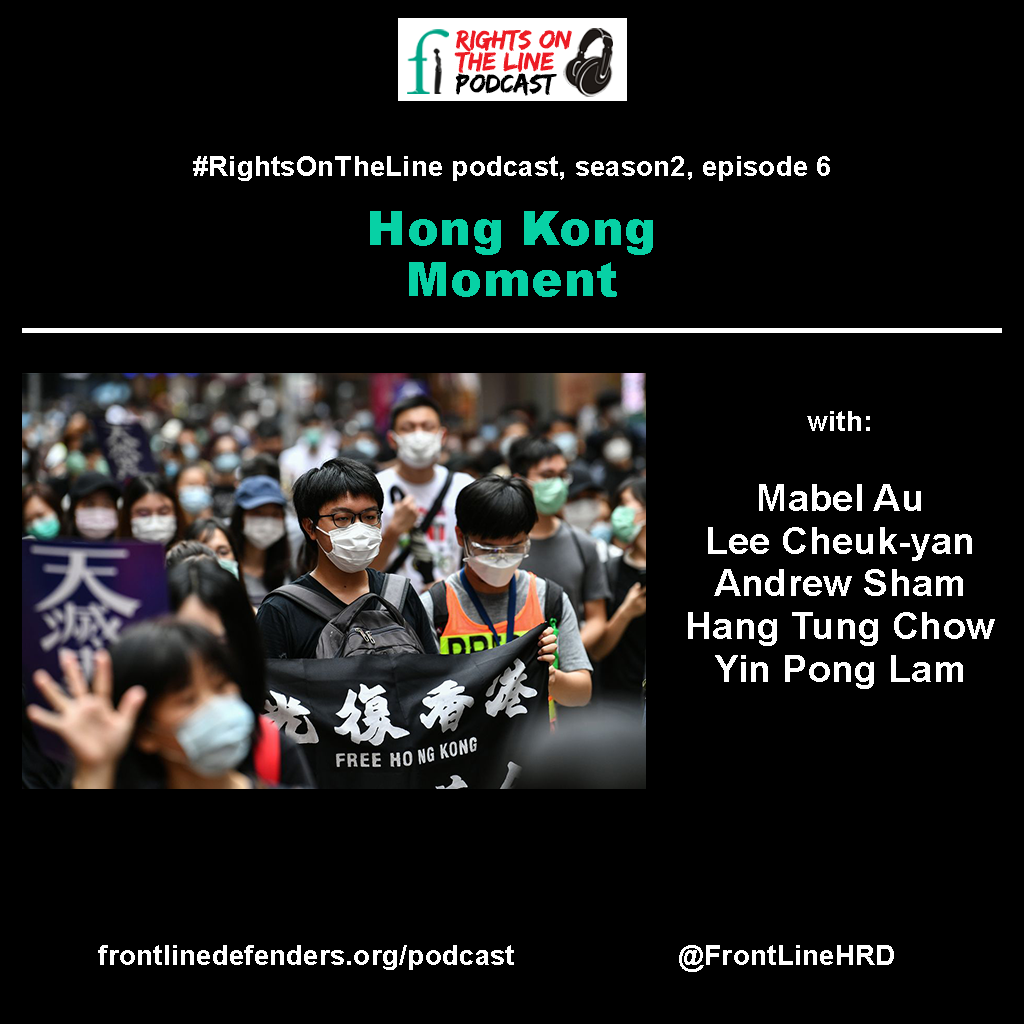
Season 2, Episode 6
Hong Kong Moment
This episode takes us to Hong Kong, where citizens are facing an unprecedented crisis brought on by China’s announcement that it would introduce new national security legislation to control the territory. Hong Kong saw a massive uprising of protest in 2019 against what was seen as moves by the Chinese government to infringe on the basic freedoms enjoyed in the city-state. It was the second mass movement in the decade, following the Umbrella Movement a few years before.
Yet now, with the world focused on dealing with a global health pandemic, Chinese authorities are moving to consolidate power in what is seen as an existential crisis for Hong Kong and its people.
Front Line Defenders discussed the situation and what it might mean for the future of human rights in Hong Kong with human rights defenders and journalists. Joining us for this episode are Mabel Au, a long time human rights campaigner, working on labour and gender rights; Lee Cheuk-yan, General Secretary of the Hong Kong Confederation of Trade Unions; Andrew Sham, Co-Founder of Civil Rights Observer; Hang Tung Chow, a lawyer and Vice President of the Hong Kong Alliance; and veteran journalist Yin Pong Lam.
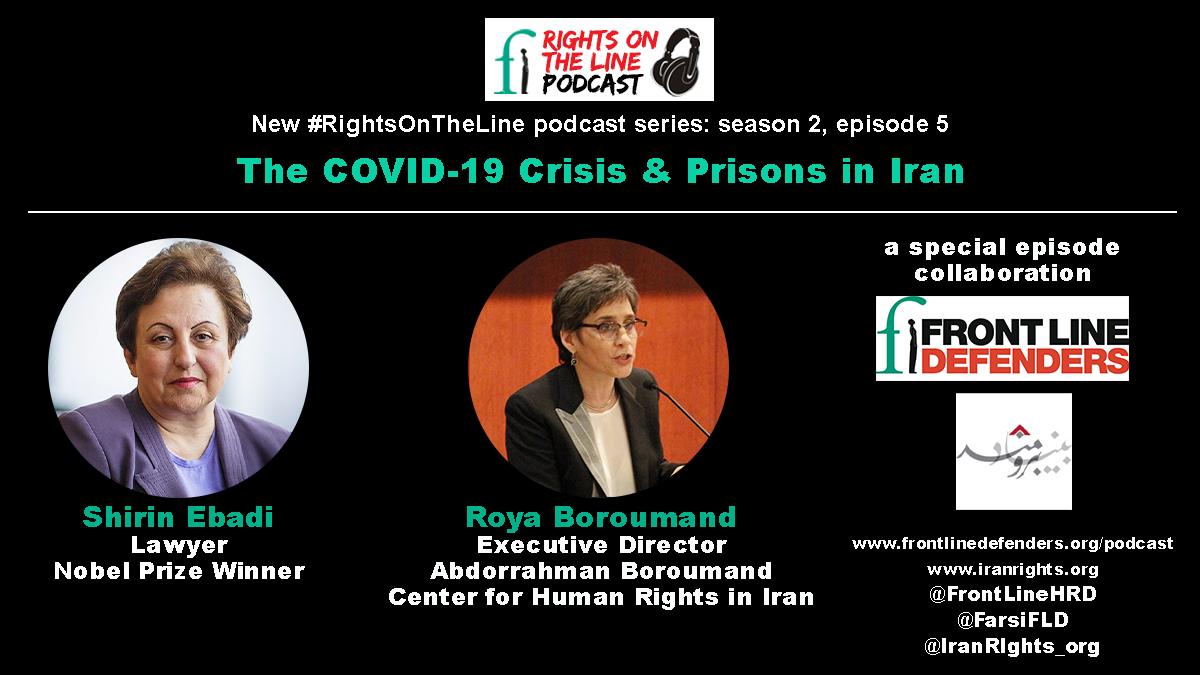
Season 2, Episode 5
The COVID-19 Crisis & Prisons in Iran
This episode of Rights on the Line focuses on the prison situation in Iran during the COVID-19 pandemic, and is a collaboration between Front Line Defenders and the Abdorrahman Boroumand Center for Human Rights in Iran, a non-governmental non-profit organization dedicated to the promotion of human rights and democracy in Iran.
In its documentation of human rights defenders cases in Iran, Front Line Defenders has often drawn attention to the poor health conditions in the prisons. The Abdorrahman Boroumand Center has also documented these conditions, most recently in its April 2020 report, “COVID-19 Fear in Iran’s Prisons”, available on the Center’s website, www.iranrights.org
The first COVID-19 cases were reported in Iran on February 19th in Qom. A month later, the annual Persian New Year celebrations of Nowruz meant that Iranians traveled extensively throughout the country as the government did not impose social distancing policies. As a result of the government’s response, compounded by sanctions and a faltering economy, Iran today is one of the global epicenters of the pandemic. As of May 11, there are almost 110,000 cases and over 6,500 dead according to official figures. Iran is among the 10 most affected countries both in terms of number of cases and number of deaths per 100,000.
The government has released approximately 100,000 prisoners in an effort to improve overcrowding at prisons, but poor conditions remain. And notably, imprisoned human rights defenders have almost entirely been excluded from furlough or release. In fact, in recent weeks, Front Line Defenders has reported on cases of HRDs being summoned to report to prison to start serving prison sentences, including Shapour Ehsanirad, Nahid Khodajo and Soha Mortezaei. Sam Rajabi, who is imprisoned in the notorious Evin Prison, was returned to prison despite having tested positive at a civic hospital while receiving treatment for another serious health condition. And long-term cases, Atena Daemi, Narges Mohammadi and Nasrin Sotoudeh remain imprisoned.
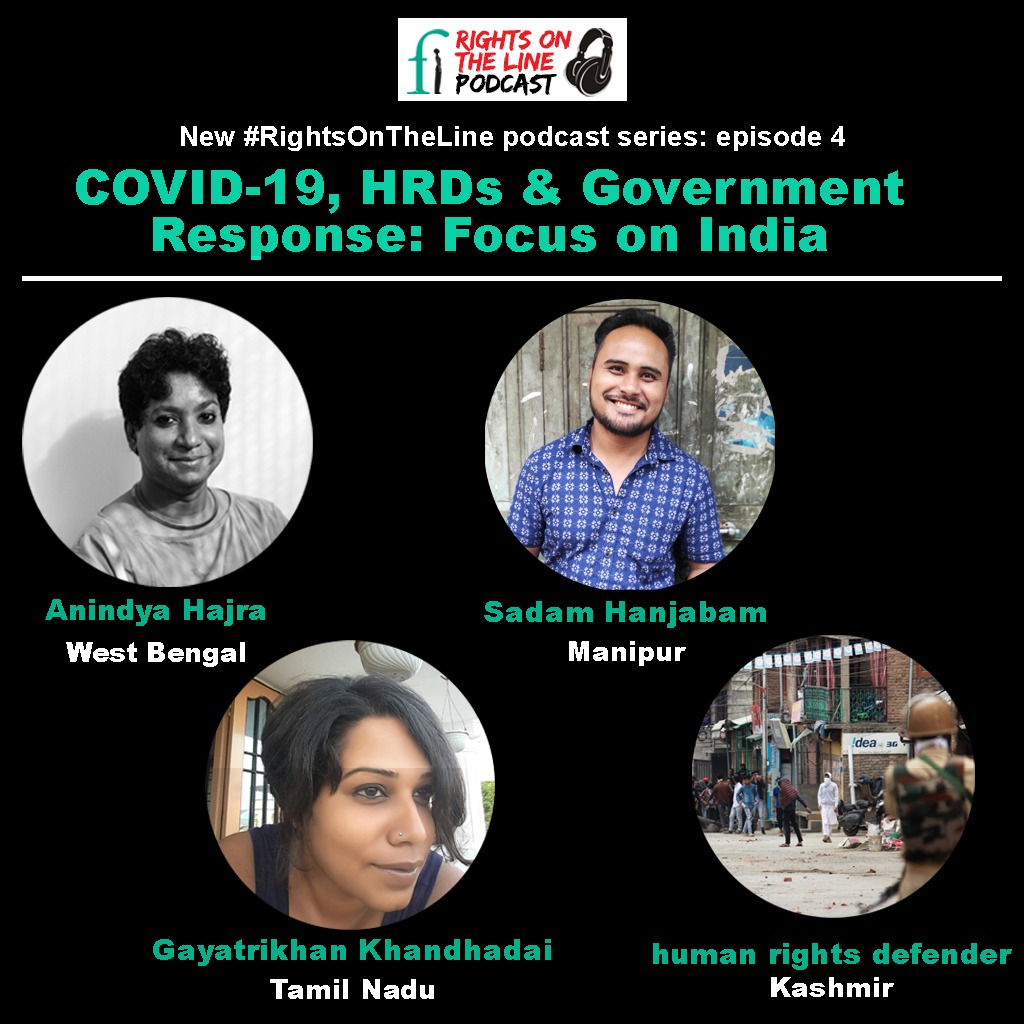
Season 2, Episode 4
COVID-19, HRDs & Government Response: Focus on India
India has not been hit as hard by the COVID-19 pandemic as other countries, at least not in official statistics. While undercounting might be due to lack of available testing, the steps the Indian government took, including a 21-day lockdown may have proven effective in staving off worst-case scenarios.
However, that does not mean the government's response has been welcomed in the country. And the measures the Modi government has taken have been widely seen as fitting into a larger trend characteristic of its Hindu-nationalist policies. From the earliest days of the crisis, the Muslim minority has been blamed for the spread of the virus. While the blaming of minorities or marginalized groups is not unique to India, the fact that this comes so soon after the passage of the Citizenship Amendment Act in December, which sparked widespread protests and attacks targeting the Muslim community, has left many suspicious of any measures the government takes in addressing the health crisis. Other minority groups have also faced rumours of blame for the spread of the virus, including the LGBT community - and especially transgendered persons. And some of the provisions of assistance for citizens announced by the government notably exclude the Muslim and trans communities due to some of the formalities and paperwork required to receive such help.
In Kashmir, a lockdown was already in place when the virus arrived in India, with internet and mobile communications largely cut off since Delhi announced in August 2019 that it would revoke Article 370, which had granted Jammu and Kashmir special status or limited autonomy since 1947. Numerous political figures and human rights defenders were detained and after protests erupted, widespread arrests followed. Just as some restrictions were starting to be lifted, the COVID-19 crisis hit, and many in the territory feared that the public health crisis would be devastating in a place cut off from access to the outside world and information. And rights groups feared that more civil liberties would be curtailed under cover of the health crisis - something that seems to be happening with the recent arrest of three Kashmiri journalists - Masrat Zahra, Peerzada Ashiq and Gowhar Geelani - who have been arrested and charged, seemingly in order to quash dissent.
The northeastern state of Manipur, which has effectively been ruled by martial law since the Armed Forces Special Powers Act was introduced in 1958, is not as isolated as Kashmir, but has been kept on the margins of national development. The state has a large presence of army and security personnel and civil society is under constant monitoring. With the first case of COVID-19 identified at the end of March, the state government put Manipur under lock down. In addition to concerns over civil liberties, more vulnerable and marginalized groups in the state are at great risk of devastating health and economic consequences.
Front Line Defenders talked with four human rights defenders to get a picture of their work, the risks they face and the context into which the COVID-19 pandemic and the government response occurs. The last few years in India has seen an increase of attacks against human rights defenders and a deterioration of space for civil society. Now, faced with a potentially devastating health crisis, how can HRDs mobilize in the Modi era? Joining us in this episode are Gayatri Khandhadai, Asia policy regional coordinator at the Association for Progressive Communications; Anindya Hajra from The Pratyay Gender Trust based in Calcutta; Sadam Hanjabam from Ya All, the first LGBT organization in Manipur; and a human rights defender from Kashmir who will remain anonymous out of security concerns.
Special thanks to The Caravan, a leading independent magazine in India, for sharing this episode and bringing it to a wider audience in India.
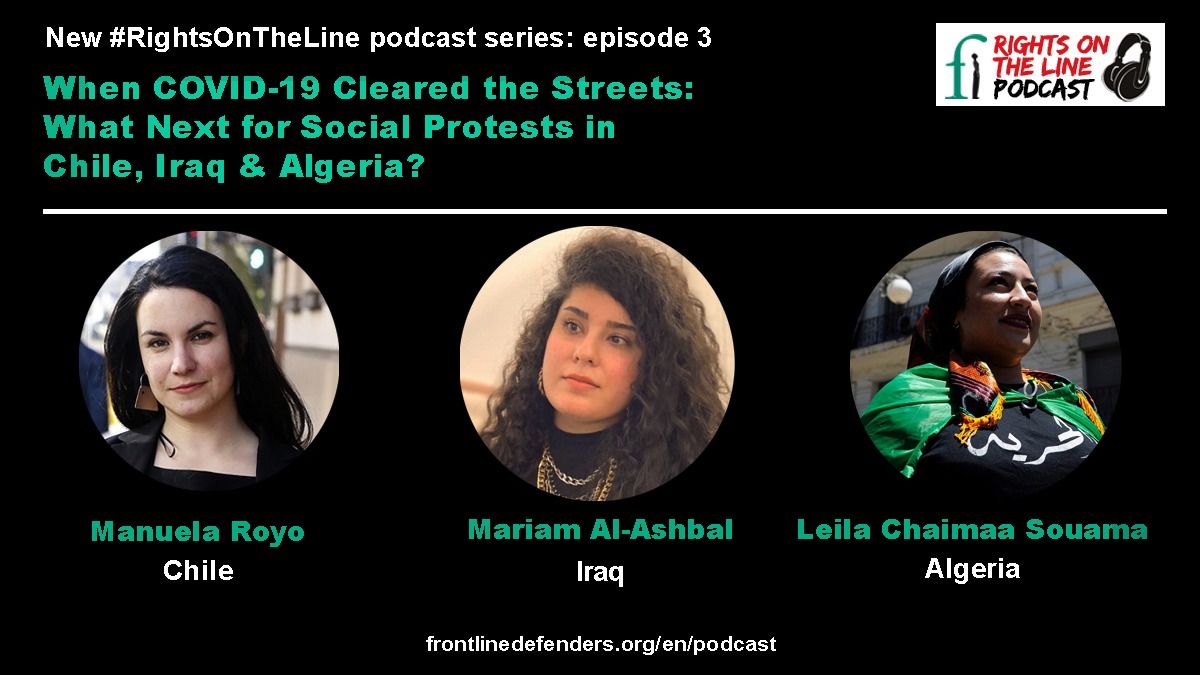
Season 2, Episode 3
When COVID-19 Cleared the Streets - Chile, Iraq & Algeria: What Next for Social Protests in Chile, Iraq & Algeria?
Across the globe, 2019 was the year of packed squares and swarming streets, as tens of thousands of people gathered or marched to protest against deep economic inequality, call for greater civil and political rights, speak up against rampant corruption, and fight for a better future. From Chile to Iraq, demonstrations were largely peaceful. Yet, the crackdown was brutal. Human rights defenders, who were often at the front lines of those protests – documenting violations, assisting those who were arrested or organising peaceful actions – were particularly targeted.
Despite the violent repression, mass protests seemed unstoppable. But the coronavirus outbreak has now succeeded where governments had failed. Social distancing rules are forcing HRDs and demonstrators to stay home, and autocratic governments are using the covid-19 pandemic as a pretext to consolidate power, approve draconian laws and repress any form of dissent. At the same time, the unfolding health, social and economic crisis is also laying bare all the problems that were driving many of the protests across the world: issues such as corruption and inequality have never been as evident and urgent as today.
In such a challenging situation, how can protest movements evolve and what role can HRDs and civil society play? In this new episode of the Rights on The Line podcast, Front Line Defenders spoke to three women human rights defenders in Iraq, Algeria and Chile to analyse current and future challenges for protest movements, but also to reflect on what can be learned from the 2019 uprisings and what can be done to keep that spirit alive.
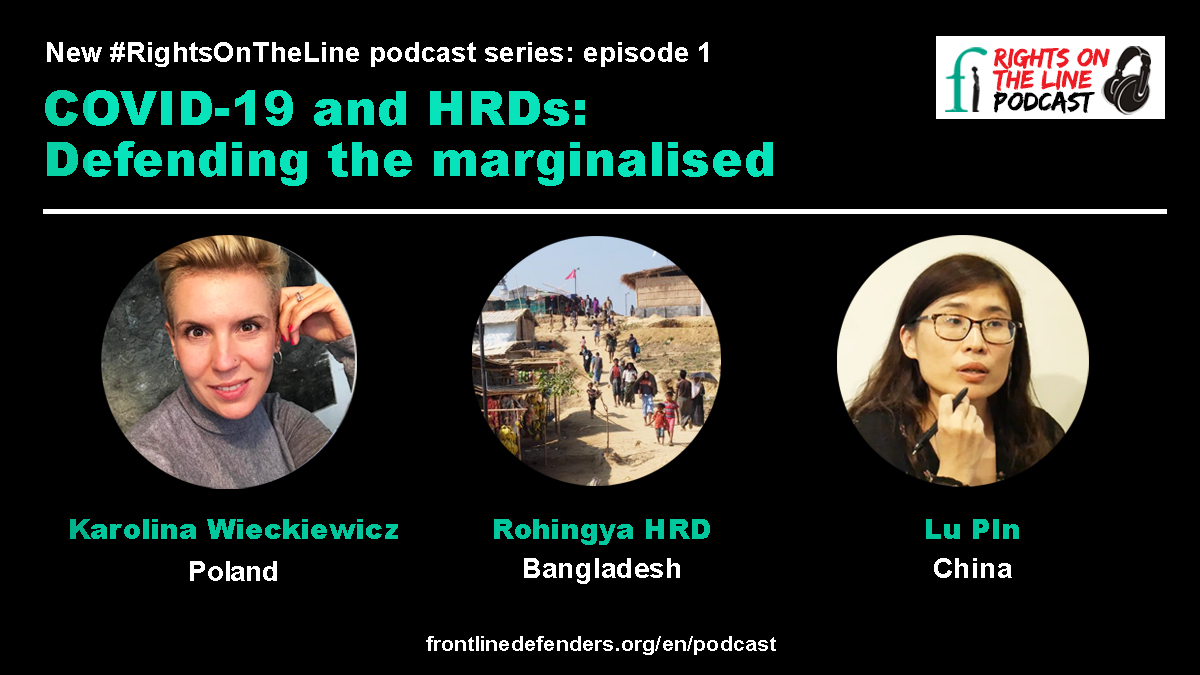
COVID-19 & HRDs: Defending the Marginalized
Season 2, Episode 2 - China, Poland & Rohingya In Bangladesh
Across the world, human rights defenders are adapting to life under the COVID-19 pandemic and working to both continue their regular work and also to provide additional support to groups who were already vulnerable and marginalized.
In this episode of the Front Line Defenders ‘Rights on the Line’ podcast, we continue to learn about the impact of the health crisis on the work of HRDs on the front lines.
In China, even as the complete closure of Wuhan was still in full effect, human rights defenders and organizations reported spikes in the number of cases of domestic violence being called in to hotlines. What has now emerged as a consequence of the stay at home policy in numerous countries is that the virus has left women trapped with their abusers. We talk with feminist activist Lu Pin about what the experience in China has been and what can be expected.
Another impact of COVID-19 is that with the overwhelming of health services to care for the sick, other medical procedures are delayed or inaccessible. For women seeking abortions who live in countries where such procedures are almost completely outlawed, traveling abroad is the only way to access their right to choose. Yet with travel restrictions and cutbacks in transportation services, these options are drastically reduced. Karolina Vienskevich from Poland joins us to talk about the situation there.
Rohingya refugees in Bangladesh are living in deplorable conditions, where risks of waterborne and other infectious diseases are exceptionally high due to their unhygienic living conditions. There have been diptheria outbreaks and respiratory and skin diseases are common. We talk with a Rohingya refugee in a camp in Cox’s Bazaar to understand what is happening now that the COVID-19 virus is present in the country.
For more information about HRDs and the COVID-19 crisis, visit Front Line Defenders website – www.frontlinedefenders.org/COVID19 .
This podcast is available on Soundcloud, Stitcher, Apple podcasts and other podcasting platforms.
More episodes assessing the impact of the COVID-19 pandemic will be released in the coming days and weeks, as we offer this podcast as solidarity to human rights defenders and their struggles for justice.
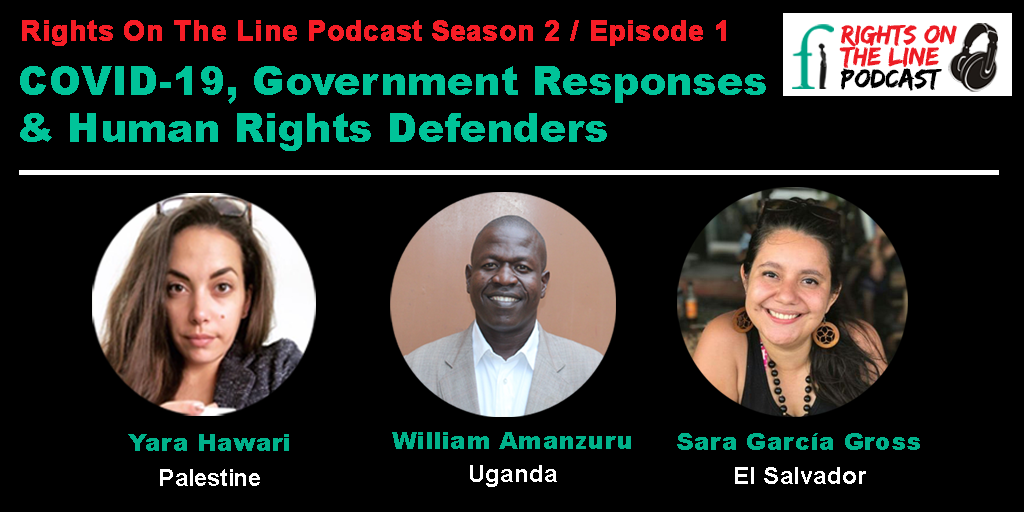
COVID-19, Government Responses & Human Rights Defenders
Season 2, Episode 1 - Palestine, Uganda & El Salvador
As the COVID-19 pandemic spreads across the globe, and communities seek to protect themselves however they can, governments are being challenged to respond. While the vast majority of governments have not done well in initial responses, some have been transparent, direct and engaged with their citizens – and the global community. Others, particularly those with authoritarian features or tendencies, are engaged in responding to the crisis that puts political and economic interests out front, crafting policy and decree accordingly. The declaration of emergency rule in too many countries only solidifies what was already there in practice, and leaves many people scared not only of the virus itself, but what may come next when life returns to what we now call normal.
Human rights defenders are responding to these challenges, as they always do – by working hard, reaching out to their communities, identifying those who are struggling or are in need or who have been left out, and trying to help. They are calling out government abuse and excess and finding new ways to communicate with each other and the outside world to challenge power.
Today, Front Line Defenders relaunches its ‘Rights on the Line’ podcast, to offer another platform for the voices, perspectives and experiences of human rights defenders at risk and leading struggles for the health, wellbeing and rights of their communities.
In this episode, Front Line Defenders speaks to feminist activist Yara Hawari from Palestine about the consequences of the pandemic for a population under military occupation. Then we discuss government response in the context of the environment in Uganda with the founder of Friends of Zoka, William Amenzuru. Finally, we hear from Sara García Gross from El Salvador, a leading women’s rights defender about the government’s response in the context of its dark past, the rampant violence against women in the country and the current dispute between the President and the opposition.
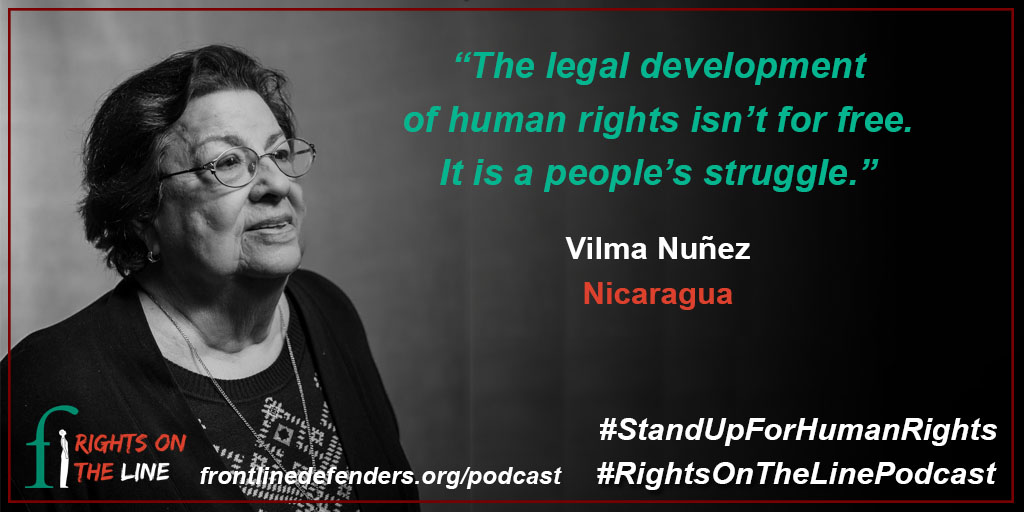
#UDHR70: Reflecting on the UN Declaration for Human Rights Defenders
In this final episode in Season 1, listen to hear HRDs reflect firsthand on the importance of - and limitations of - UN Declarations on the 70th anniversary of the UN Declaration on #HumanRights and in the 20th year of the Declaration on #HumanRightsDefenders. Hear from Maria Munir of the United Kingdom, Omar Faruk Osman of Somalia and an excerpt of Vilma Nuñez, of the Nicaraguan Centre for Human Rights contribution to the opening plenary at the 2018 HRD World Summit in Paris in October.
Released 10 December.
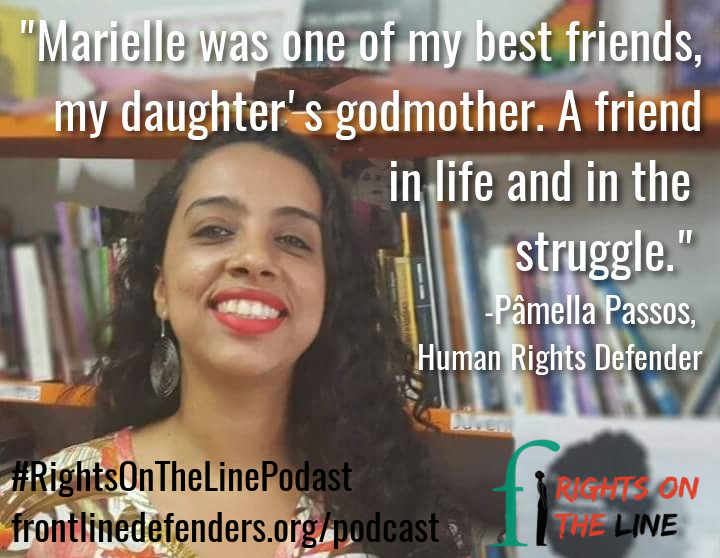
Interview with an HRD: Pâmella Passos
Brazilian human rights defender Pâmella Passos. Pâmella spent six weeks in Dublin as part of Front Line Defenders’ Rest and Respite program earlier this summer, just months after the death of her friend and well-known human rights defender and councilwoman Marielle Franco, who was murdered in Rio de Janeiro in on the 14th of March.
Released 1 October 2018.
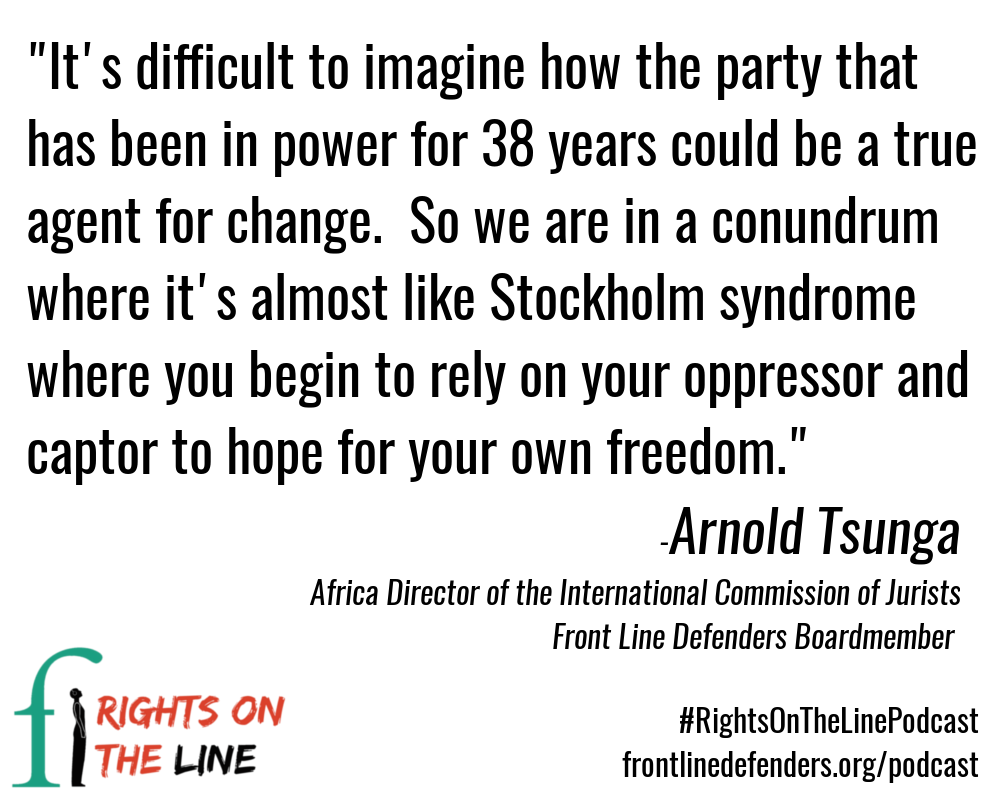
National elections and human rights
On this episode we talk about elections and how they can impact human rights defenders. By looking at some of the federal elections that have taken place this year, we’ll be able to see the different and nuanced ways political changes at the national level can impact the situation for those fighting for human rights in that country. Over the next half hour we’ll be moving region to region across the globe to discuss recent elections in Mexico, Zimbabwe, Pakistan and Cambodia.
Released 25 September.
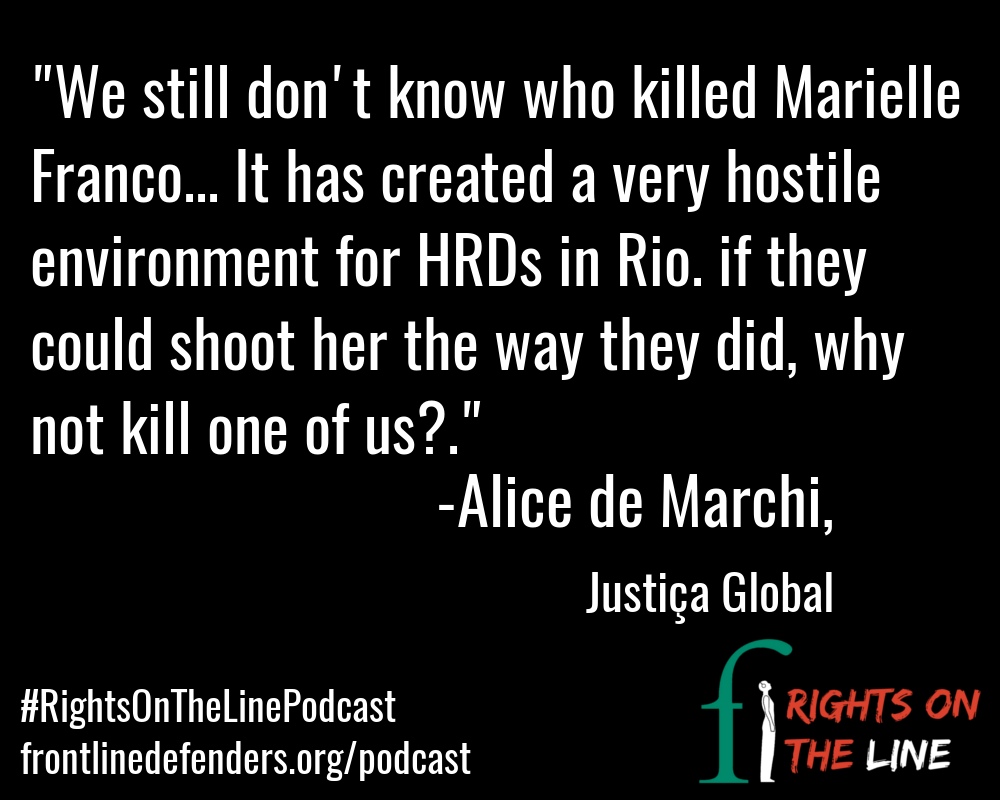
#StopTheKillings The targeting of HRDS
On 20 June, at an event alongside the United Nations Human Rights Council meeting in Geneva, Front Line Defenders released a report on the killings of HRDs wordlwide. Focusing on the six countries with the highest number of killings, and by that we mean targeted attacks, assassinations, extrajudicial killing by the state or authorities. To bring you additional insight into this issue, Rights on the Line spoke to human rights defenders from Mexico, the Philippines and Brazil, three of the six countries profiled in the report. In this episode we hear from:
Cristina Palabay, Karapatan
Alice de Marchi, Justiça Global
Laura Freyermuth, Comite Cerezo
Jim Loughran, HRD Memorial Project
Released 22 June 2018
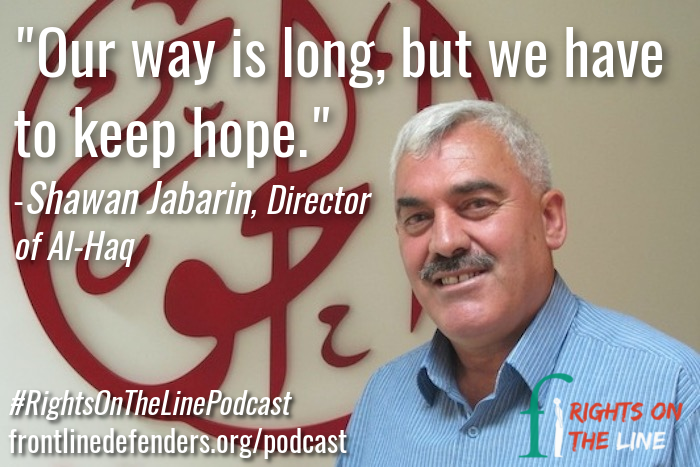
Interview with an HRD: Shawan Jabarin #OPT / #Israel
#LandRights #Self-Determination While in town to meet with legislators on the potential Occupied Territories Bill, Palestinian human rights defender Shawan Jabarin sat down with Rights on the Line to discuss his work defending human rights in Palestine as well as responsibility of the international community to intervene and advocate on behalf of those subject to actions that violate international human rights law.
Released 18 June 2018.
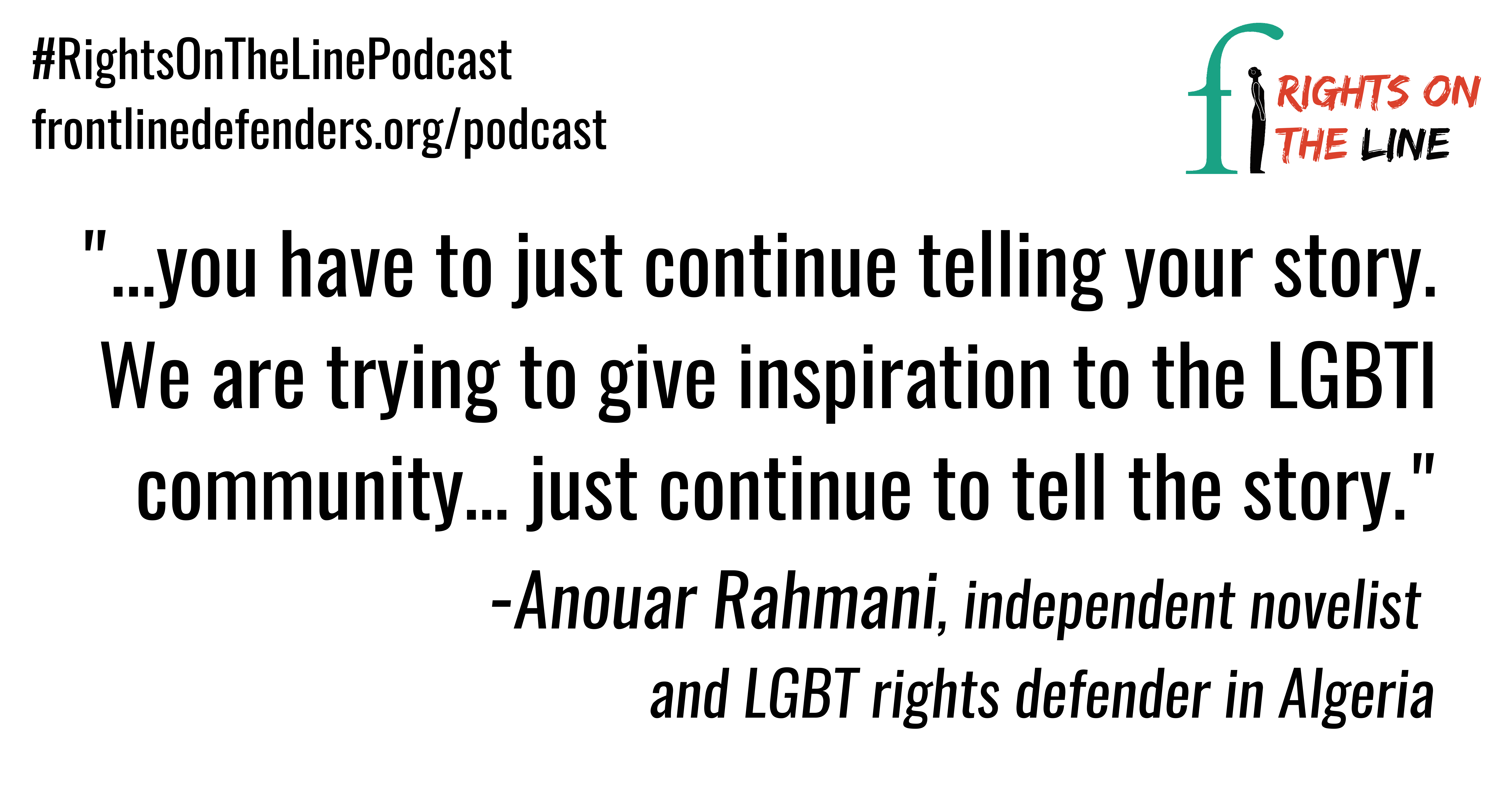
Latest Episode: #IDAHOTB2018: Defending LGBT Rights in Algeria, Kenya and Turkey
#LGBT Rights On the International Day Against Homophobia, Biphobia and Transphobia, Rights on the Line brings you three interviews with three LGBTI rights defenders. Listen to hear them speak about the work they do, the consequences they face for their advocacy and the unique challenges LGBTI defenders face within the human rights movement. Tune in to hear from:
Anouar Rahmani, independent novelist and LGBT rights defender in Algeria
Blessol Gathoni, LGBT activist and community organizer working in Kenya
Yildiz Tar, the Media and Communications Officer for LGBT organization Kaos GL in Turkey
Released 17 May 2018
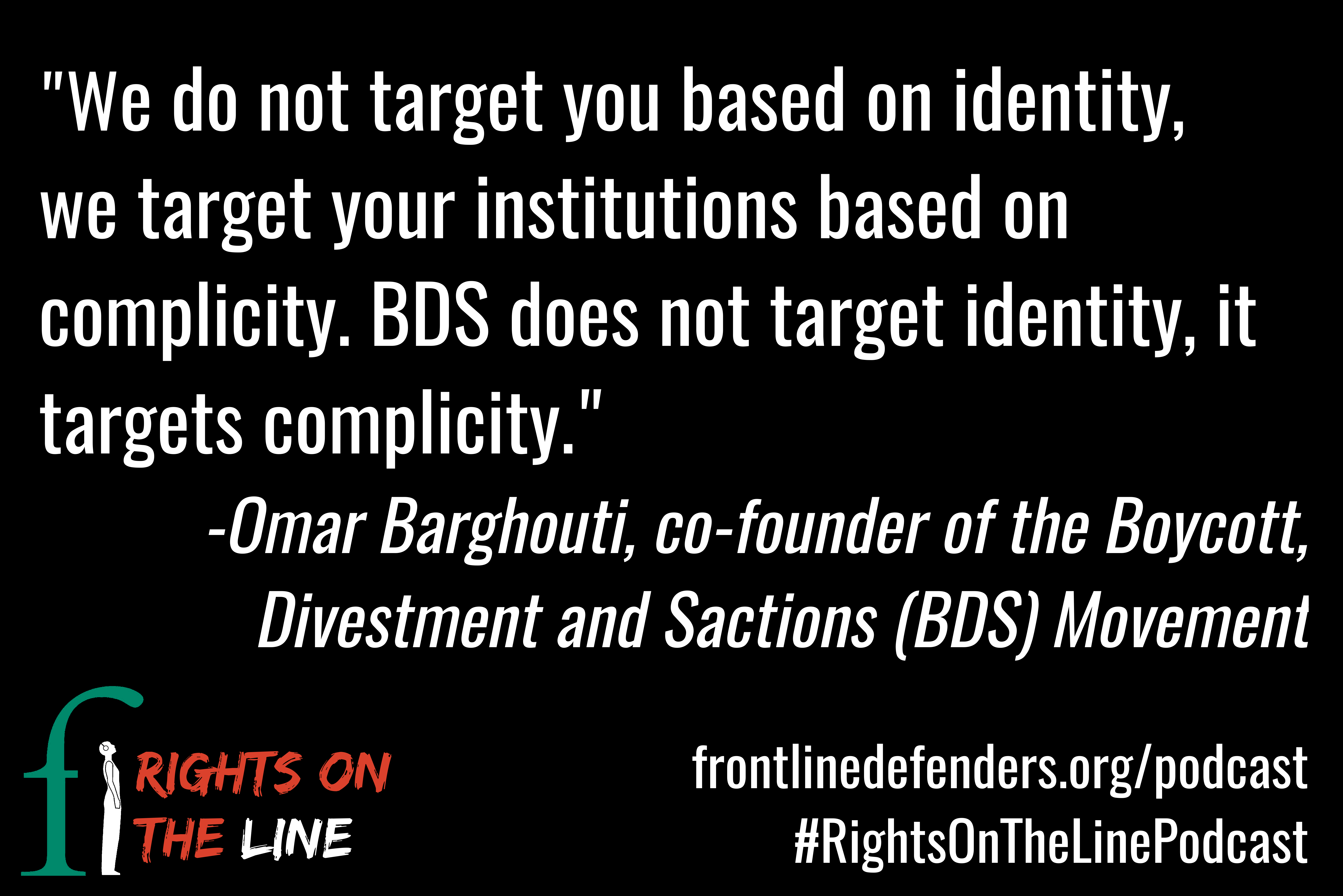
#Nakba70: Human rights in Palestine
#PrisonersRights #LabourRights #FreedomofExpression
On the 70th anniversary of the creation of the state of Israel, known as al Nakba, or the catastrophe, as it resulted in the displacement of hundreds of thousands of Palestinian people. Today marks 70 years of the existence of this state and it’s apartheid regime that routinely violates the human rights of Palestinian people, international law and United Nations conventions. To mark this day, Rights on the Line brings you three interviews with advocates of human rights in Palestine. Tune in to hear from:
Sahar Francis, the Director of Adammeer, a prisoner’s rights organization
Jamal Juma, Coordinator of the Stop the Wall campaign
Omar Barghouti, the co-founder of the Boycott, Divestment and Sanctions movement
Released 15 May 2018
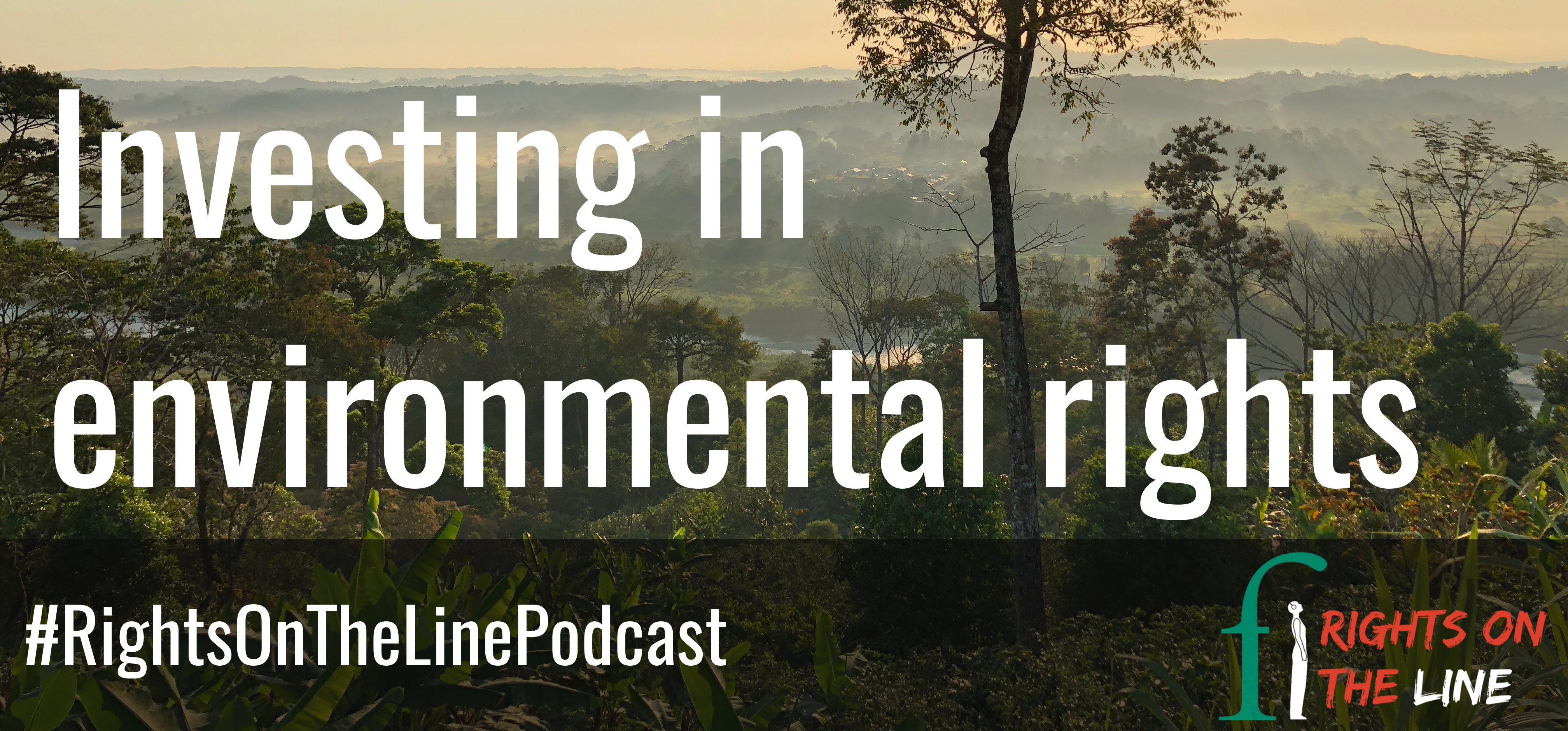
Investing in Environmental rights
On this episode of Rights on the Line, we discussed some of the risks faced by environmental rights defenders advocating against large-scale development projects, the role international investors can play in protecting human rights and the role of international and local legislation in protecting Indigenous land claims in the face of environmentally destructive 'mega-projects'.
We heard from two HRDs, student activist Francisco Simon Francisco of Guatemala and human rights lawyer Nelson La Madrid in Bolivia. We also spoke with Front Line Defenders' Head of Protection Ed O'Donovan and HRD Visibility Coordinator Maria San Martin.
Released 24 April 2018.
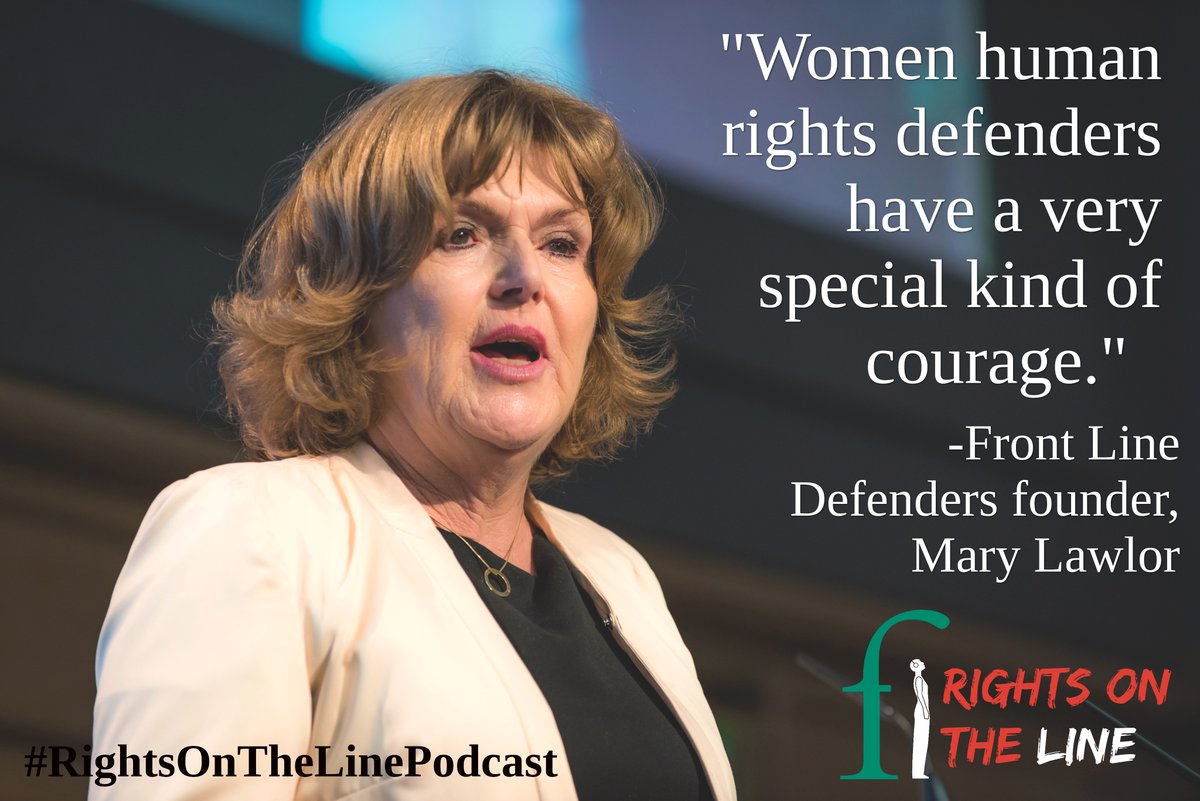
International Women’s Day 2018: Spotlight on WHRDs
For International Women’s Day, Rights on the Line is handing the mic over to a few of many WHRDs who work every day of the year for their own rights and the rights of their communities. Tune in to hear these WHRDs speak about their work as human rights defenders:
- Ruth Komuntale #Uganda
- Graciela Pérez Rodriguez #Mexico
- Emel Kurma #Turkey
- Sindy Joyce #Ireland
- Tasneem Ahmed Taha Zaki #Sudan
- Hauwa Haruna #Nigeria
- Hannah Vu #Vietnam
- Kimsor Lim #Cambodia
8th March is #InternationalWomensDay, but these women are advocating for human rights all year round. Listen to hear about their work and the human rights violations their communites are facing.
Released 8 March 2018.
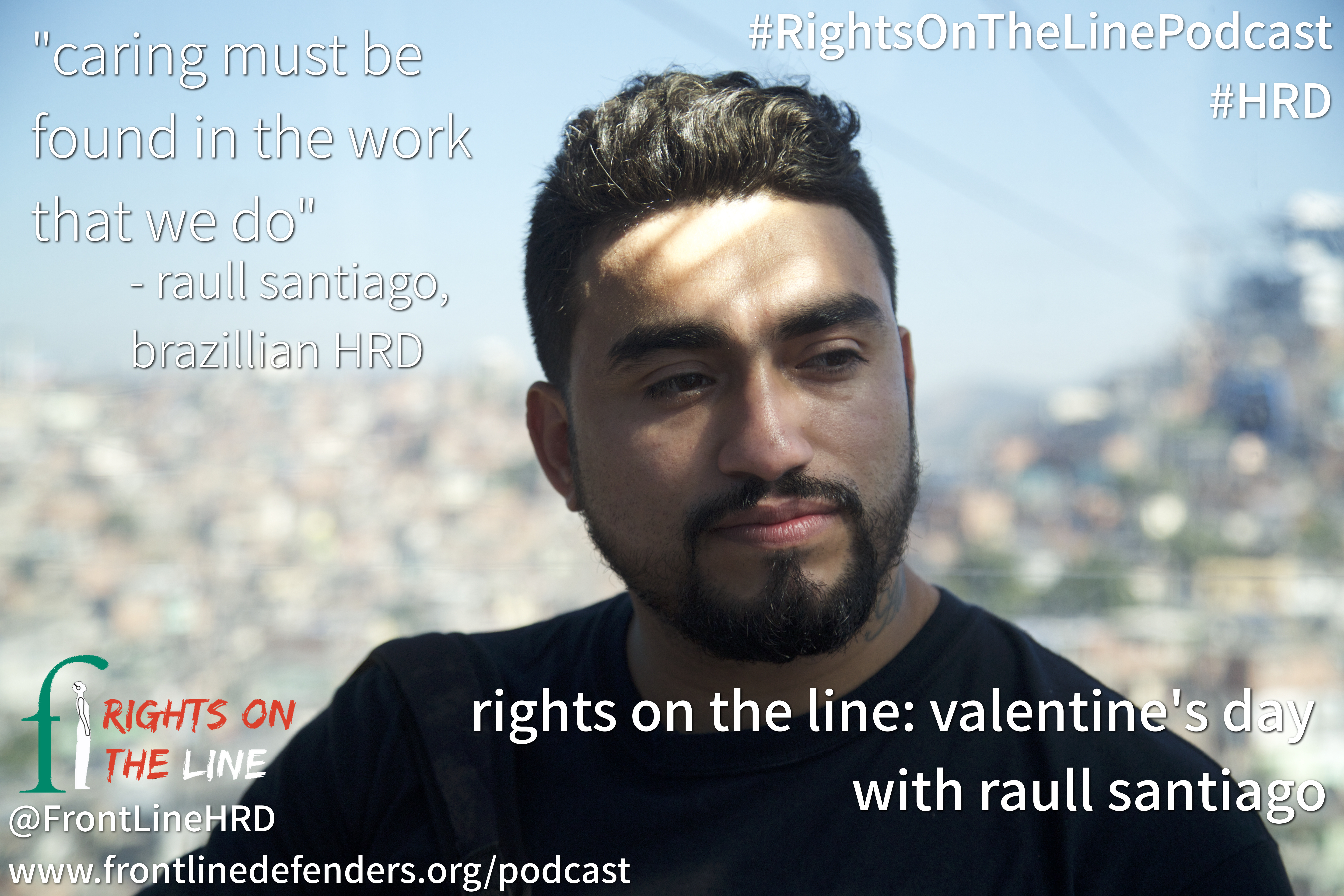
Valentine’s Day with Raull Santiago: Caring for yourself, caring for your community
Valentine’s Day. Self Care. Duty of Care. Human rights. How do these these connect? Listen to the debut episode of Rights on the Line, produced by Front Line Defenders, to hear about award-winning Brazilian human rights defender Raull Santiago’s work in Rio de Janeiro’s favelas, how it impacts his family life and his experience on Front Line Defenders Rest & Respite program.
Raull Santiago is a human rights defender from Rio de Janeiro, Brazil. In March 2014, he co-founded the collective Papo Reto (Straight Talk), a group of citizen journalists documenting life in the Complexo do Alemão favela. The group draws attention to what is happening in Alemão, highlighting the cases of police violence and other human rights abuses, which tend to be ignored by mainstream media. Their slogan is: Nós por Nós (Us for Us), as the content they share is produced by residents living in the favela and dedicated to them.
Released 16 February 2018. Languages: English, Portuguese






